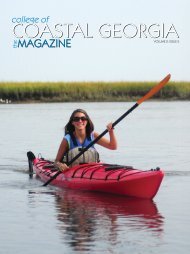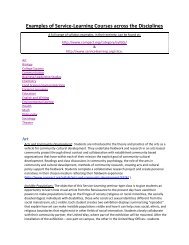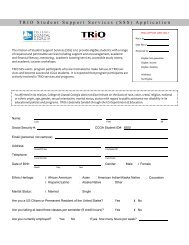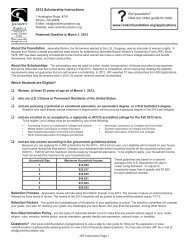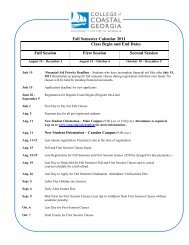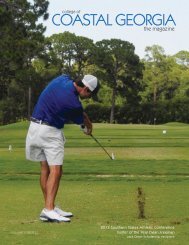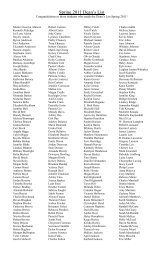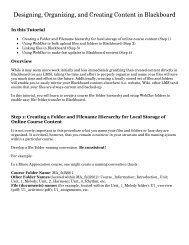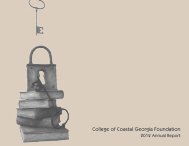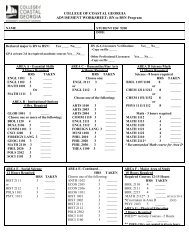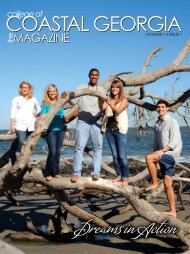Full PDF Download - The College of Coastal Georgia
Full PDF Download - The College of Coastal Georgia
Full PDF Download - The College of Coastal Georgia
- No tags were found...
You also want an ePaper? Increase the reach of your titles
YUMPU automatically turns print PDFs into web optimized ePapers that Google loves.
college <strong>of</strong>COASTAL GEORGIAVOLUME 1 • ISSUE 1theMAGAZINE
On Campus...Welcome Aboard<strong>College</strong> <strong>of</strong> <strong>Coastal</strong> <strong>Georgia</strong> President Valerie A.Hepburn welcomed 20 new faculty members tocampus for fall semester 2010.“<strong>The</strong>re is tremendous excitement on campus with thereturn <strong>of</strong> the students, the construction progress, and theaddition <strong>of</strong> 20 faculty members to deliver our academicmission,” said Dr. Hepburn. “<strong>The</strong> quality <strong>of</strong> our facultyenables us to move forward with our new baccalaureateprograms. We are thrilled to be welcoming these newteam members.”Learn more about the new faculty on the collegewebsite at www.ccga.edu/NewFaculty.Bobby Haven<strong>The</strong> Maestro PerformsOver 200 people attended a stellar benefit performance on campusin December by Maestro Luis Haza, accompanied by pianistOrlando Alonso. Maestro Haza recently moved to the area afterretiring as first violinist with the National Symphony Orchestra andas music director <strong>of</strong> the American Youth Philharmonic Orchestras.Almost $20,000 was raised to benefit cultural and performing artsprogramming at the <strong>College</strong>.As part <strong>of</strong> the evening’s festivities, President Valerie Hepburnannounced establishment <strong>of</strong> the <strong>College</strong> <strong>of</strong> <strong>Coastal</strong> <strong>Georgia</strong>Foundation’s Planning Committee for Cultural, Arts, and LifelongLearning Programs. Foundation Trustee Anita Timmons will serve aschair <strong>of</strong> the new Foundation committee, which convened in January,2011. Trustee Willou Smith will serve as vice chair. Communityparticipants include Millard Allen, Alice Barlow, Shirley Douglass,Julie Epstein, Norman Haft, Maestro Luis Haza, Heather Heath,Robert Klem, Malinda Jolley Mortin, Diana Murphy, Terry Readdick,Nathaniel Roper, Mark Spaulding, Abney Whitehead, and MildredHuie Wilcox.On the Cover<strong>Coastal</strong> <strong>Georgia</strong> students (left to right) LindseyLittle, Stephanie Peeples, David Gomes, HayleyAmick, and Colby O’Connor take a break from classesto enjoy Driftwood Beach on the north end <strong>of</strong> JekyllIsland. Through a unique partnership with the JekyllIsland Authority, full-time <strong>Coastal</strong> <strong>Georgia</strong> studentsreceive special passes as a benefit <strong>of</strong> their student activityfee. <strong>The</strong> decals provide unlimited access to the island forone year.Learning through EngagementAccreditation by the Southern Association<strong>of</strong> <strong>College</strong>s and Schools Commission on<strong>College</strong>s (SACSCOC) entails a thorough review<strong>of</strong> the <strong>College</strong> every ten years. Since 2001, boththe <strong>College</strong> and the accreditation methodologyhave changed, but the expectation for 2011remains the same: a seal <strong>of</strong> approval for a qualityeducation. <strong>The</strong> <strong>College</strong> is implementing a plan t<strong>of</strong>urther enhance that quality through service-learning initiatives: Learningthrough Engagement. Meet the new Director <strong>of</strong> Service Learning, Dr.Clayton Hurd, on page 22. In the next issue <strong>of</strong> the magazine, look forthe first in a series <strong>of</strong> articles detailing the plan, the process, the program,and the impact.
From the President’s DeskIn this IssueVOLUME 1, ISSUE 1 • JANUARY 2011Welcome to theinaugural issue <strong>of</strong><strong>College</strong> <strong>of</strong> <strong>Coastal</strong><strong>Georgia</strong> – the Magazine.As you read through thesepages, you’ll discover newand exciting things happeningacross the campus and thecommunityWe are excited to tell youabout our new bachelor’sdegree programs in BiologicalSciences and HealthInformatics, programs that <strong>of</strong>fer fascinating career opportunitiesand are integral to our region. <strong>The</strong> supportive relationshipsbetween the Southeast <strong>Georgia</strong> Health System, the <strong>Coastal</strong>Resources Division <strong>of</strong> the <strong>Georgia</strong> Department <strong>of</strong> NaturalResources, and the <strong>College</strong> help to make such community-asthe-classroominitiatives possible.You will learn about our talented and committed faculty andmeet our new Director <strong>of</strong> Service Learning. We are pleasedto showcase faculty members whose published work andpresentations include collaboration with students.We highlight several <strong>of</strong> our dynamic and service-orientedstudents. LaTanya Abbott-Austin is the first Student GovernmentAssociation president elected by the student body in almosttwo decades. Samelia King is the outstanding freshman whoreceived our first Regents’ scholarship. Dani Siekkinen is anaspiring educator and Chase Miller is a talented student-athletehelping to lead our new men’s varsity golf team.We invite you to join us in celebrating our legacy as werecognize the 50th anniversary <strong>of</strong> the <strong>College</strong>’s chartering.Explore our current transformation and new construction, whileyou visit with Dr. John Teel, the <strong>College</strong> president whose visionprovided the framework for our transition.As you close the cover, we hope you will be inspired to visitour campus. Prospective students are invited to tour. Alumniare invited to reconnect. <strong>The</strong> community is invited to experienceour cultural and performing arts programs, exciting athleticcompetitions, scholarly research presentations, and familyfriendlyactivities every semester. Our progress truly representsDreams in Action – for our students, for our <strong>Coastal</strong> <strong>Georgia</strong>communities and for all <strong>of</strong> us at the <strong>College</strong>.EOV Photography2 Fast-Tracking Transformation6 <strong>The</strong> Teel Legacy10 Taking the Pulse <strong>of</strong> theBusiness Community14 A New First Every Day16 Sand Traps, Not Sand Dunes17 A Book Born <strong>of</strong> a StudentConversation18 Going <strong>Coastal</strong>21 Madam President22 <strong>The</strong> Community as theClassroom24 Health Informatics –A Simple Definition26 From BJC to the <strong>Georgia</strong> House28 <strong>The</strong> <strong>College</strong> <strong>of</strong> <strong>Coastal</strong> <strong>Georgia</strong>Foundation29 Meet Dr. T<strong>College</strong> <strong>of</strong> <strong>Coastal</strong> <strong>Georgia</strong> - the Magazineis produced by the Advancement Office <strong>of</strong> the<strong>College</strong> <strong>of</strong> <strong>Coastal</strong> <strong>Georgia</strong>, with the support <strong>of</strong>the <strong>College</strong> <strong>of</strong> <strong>Coastal</strong> <strong>Georgia</strong> Foundation.Advancement OfficeElizabeth Weatherly, Assistant Vice PresidentJohn Cornell, Director <strong>of</strong> Marketing and PRTiffany Cherry, Web DeveloperRobin Flores, Department CoordinatorPeggy Golden, Staff Writer/Special Projects CoordinatorManaging Editor/Layout and DesignJohn CornellEditor/Senior WriterPeggy GoldenEditorial AssistanceApryl Dervay, Colby O’Connor ’14,Meah Thornton ’13, Mark Toolan ’12Photography by John Cornell unless otherwise noted.Please send all comments and story ideas that you would like tosee included in future issues <strong>of</strong> the Magazine to ia@ccga.edu.Copyright 2011 - <strong>College</strong> <strong>of</strong> <strong>Coastal</strong> <strong>Georgia</strong><strong>College</strong> <strong>of</strong> <strong>Coastal</strong> <strong>Georgia</strong> – the Magazine 1
Fast-trackingTransformation<strong>The</strong> <strong>College</strong> <strong>of</strong> <strong>Coastal</strong> <strong>Georgia</strong> may be <strong>Georgia</strong>’s newest state college in theUniversity System, but it’s not new. <strong>The</strong> task was how to transform a two-yearcommunity college with 49 years <strong>of</strong> history into a four-year baccalaureate institutionpositioned for the future. One that would provide an education firmly grounded in21st century knowledge and skills, service learning, global awareness, and engagedentrepreneurship.<strong>The</strong> consensus: that vision required some intense planning andprioritizing. This wasn’t about words; this was about concrete,costs, and cohesiveness.<strong>College</strong> President Valerie Hepburn noted in her introductionto the strategic master plan, published in May 2009, that the<strong>College</strong> did not want a traditional plan that only elaboratedphysical elements.“We sought to place future physical development <strong>of</strong> our campussquarely into the strategic context <strong>of</strong> our academic, student/campuslife and community/economic development strategies and priorities.“Similarly, we tested our building and campus needs againstrealities <strong>of</strong> funding and implementation – to have a truly pragmaticroad map <strong>of</strong> campus improvements that can be accomplished overthe next decade.“Finally, we emphasized intelligent adaptation and reuse<strong>of</strong> facilities in which the taxpayers <strong>of</strong> <strong>Georgia</strong> alreadyhave an investment – limiting new buildings to those strictlynecessary by aggressive assumptions about good use <strong>of</strong> space andmodernization.”Master Planning<strong>The</strong> Master Plan Steering Committee, chaired by FoundationTrustee Duane Harris, included representatives from the<strong>College</strong> student body, faculty and staff, Foundation trustees,and community leaders. Working with the consulting team <strong>of</strong>Eva Klein & Associates and Perkins Eastman, the committeeengaged in a seven-month process to develop 2020 Vision – astrategic master plan for the next 10 years.<strong>The</strong> process had little to do with crystal balls. Much <strong>of</strong> thework entailed empirical data: statistical analysis, projections forregional growth, and community/business needs assessment.Commitments were already in place. <strong>The</strong> University System<strong>of</strong> <strong>Georgia</strong> Regents approved four initial baccalaureateprograms for immediate implementation, impacting facultyand facilities. <strong>The</strong> Southern Association <strong>of</strong> <strong>College</strong>s andSchools approved the <strong>College</strong> level change from a Level 1 to aLevel 2 institution – baccalaureate accredited. Plans developedfor increased partnering with the Southeast <strong>Georgia</strong> HealthSystem.2 <strong>College</strong> <strong>of</strong> <strong>Coastal</strong> <strong>Georgia</strong> – the Magazine
Sophomore Meah Thornton <strong>of</strong> Jesup, <strong>Georgia</strong>, is excitedabout campus expansion, but admits she’ll be glad whenmid-campus construction is completed next year.<strong>College</strong> <strong>of</strong> <strong>Coastal</strong> <strong>Georgia</strong> – the Magazine 3
Artists’ renderings <strong>of</strong> the Campus Center (left) and the Health and Science Building (right) reflect the Spanish Mission architectural theme. CampusCenter construction is on target for completion by July 2011. Classes will be held in the Health and Science Building beginning January 10, 2011.New faculty recruitment immediately became a priority.Increasing enrollment was recognized as critical for success.Both required more and differently-purposed space for working,studying, and socializing. <strong>The</strong> new degrees were the catalyst:• Bachelor <strong>of</strong> Business Administration• Bachelor <strong>of</strong> Science in EducationEarly Childhood/Special EducationMiddle Grades• Bachelor <strong>of</strong> Science in NursingFollowing development <strong>of</strong> the master plan, additionalbaccalaureate degrees were approved:• Bachelor <strong>of</strong> Science in Health Informatics• Bachelor <strong>of</strong> Science in Biological SciencesBiology Education<strong>Coastal</strong> EcologyPre-pr<strong>of</strong>essionalBiology Education prepares science majors to teach at the highschool level. <strong>The</strong> Pre-pr<strong>of</strong>essional prepares students for graduatepr<strong>of</strong>essional programs such as medicine, pharmacy, bio-medicalresearch, veterinary medicine, and coastal ecology (see p. 18).2020 Vision with 20/20 Hindsight<strong>The</strong> new degrees were specifically tailored to the coastal region -supported by the local business community but with statewideimplications for careers and economic growth. <strong>The</strong> expectation,according to Dr. Hepburn, is for programs such as these,combined with the beautiful natural environment <strong>of</strong> the area,to draw students from beyond surrounding counties. “<strong>The</strong><strong>College</strong> <strong>of</strong> <strong>Coastal</strong> <strong>Georgia</strong> will become a destination college,”she explained, “and embracing that requires on-campus housingand enhanced campus life.”But she is equally emphatic about the level <strong>of</strong> <strong>College</strong>involvement in the community. “If we are successful, Brunswickwill be a ‘college town’ and Camden County will enjoy thebenefits <strong>of</strong> a four-year college.”Commitment to community engagement includes:• Offering small business development services andregional workforce analysis and economic forecastingthrough the School <strong>of</strong> Business;• Partnering for community and urban development inareas surrounding the campus;• Supporting service learning partnerships with areabusinesses, organizations and schools to supportinternships, co-op work assignments, and real-worldapplication <strong>of</strong> classroom studies;• Continuing volunteer projects organized by students,staff, and faculty to “give back” to the community;• Creating an environment to nurture and supportcommunity arts and culture. This includes sponsorship<strong>of</strong> programs, performances, and exhibits open to thecommunity and held at a new facility – the <strong>Coastal</strong>Community Center for the Arts.2020 Vision anticipates an enrollment <strong>of</strong> 4,000 students by2015; 6,000 students by the end <strong>of</strong> this decade; and an ultimatecapacity for 10,000 students. (Nearly 3,500 students enrolledfor fall semester 2010.) <strong>The</strong> plan calls for on-campus studenthousing (600 beds), a new Campus Center, and modernization<strong>of</strong> a significant portion <strong>of</strong> the existing <strong>College</strong> facilities. “We tooka leap <strong>of</strong> faith,” Dr. Hepburn noted, “but this transformationis grounded firmly in reality. <strong>The</strong> Board <strong>of</strong> Regents identified aregional gap in the University System. Our community told uswhat’s been missing. This plan is based on those recognized needs.”Construction Projects & ProgressUnlike Cinderella’s transformation, no magic wands areinvolved. But turning the former Applied Technology Buildinginto the Student Activity Center (SAC) was almost as astoundingas the pumpkin-to-carriage trick. <strong>The</strong> building was gutted.Space formerly used for teaching car mechanics and HVACmaintenance now houses student organization <strong>of</strong>fices, space forsocializing, a vending café, a small performance area, and a pati<strong>of</strong>or campus pizza parties and cookouts.“<strong>The</strong> SAC is the hub for student life on campus – aplace to study and hang out together before, after, andin-between classes, right in the middle <strong>of</strong> campus. Evenwhen the new Campus Center opens in July 2011,” Dr.Hepburn continued, “this building will provide meeting and<strong>of</strong>fice space for the Mariners’ Log, the Student GovernmentAssociation, the Programming Board, and all the otherstudent organizations.”Repurposing the building was part <strong>of</strong> Dr. Hepburn’scommitment to respect the taxpayers’ investment in existing4 <strong>College</strong> <strong>of</strong> <strong>Coastal</strong> <strong>Georgia</strong> – the Magazine
<strong>The</strong> new Pedestrian Mall (left) opens the center <strong>of</strong> the academic quadrangle to green space and simplifies cross-campus walking and cyclingbetween the new student residential complex (right) and classrooms.structures. Current renovation <strong>of</strong> the Hargett AdministrationBuilding is another example.<strong>The</strong> new construction, however, is visible all across thecampus. Tennis courts were torn out. Streets and sidewalksdisappeared. And new structures, recognizable from theirframing and stucco, rise above the construction fence irregularlygridding the campus.When touring the <strong>College</strong> campus September 3, Dr. MichaelF. Adams, President <strong>of</strong> <strong>The</strong> University <strong>of</strong> <strong>Georgia</strong>, quipped, “Thatlooks like the new science building I wanted being built rightover there.” He later commended the planning, particularly thepedestrian-based campus and on-campus student housing, anddescribed the new Health and Science Building as “a magnificentstatement <strong>of</strong> academic commitment.”<strong>The</strong> new tennis courts open for play in January. <strong>The</strong> PedestrianMall, once the staff parking lot but now the central green zone<strong>of</strong> the campus academic core, will be completed by mid-January.<strong>The</strong> new Health & Science Building is scheduled for occupancyin January, with a parking lot between the building and AltamaAvenue to be completed by spring. <strong>The</strong> Campus Center andthree sections <strong>of</strong> on-campus student housing are on track forJuly 2011 occupancy – just in time for fall semester. Fundingto build the proposed 30,000-square-foot Teacher Educationand Learning Center is included in the fiscal year 2012 Board <strong>of</strong>Regents’ capital budget request.Eventually the north entrance to the campus, <strong>of</strong>f AltamaAvenue, will become the “front door” to the <strong>College</strong>. Instead<strong>of</strong> driving through campus, student will be walking and bikingacross it. “We want to create a new, exciting and environmentallyappropriate look on our campus,” Dr. Hepburn affirms. “Thatincludes introducing the Spanish Mission architectural style, seenelsewhere in this region, using indigenous plants in landscaping,and being mindful <strong>of</strong> scale, climate, and inherent Southerngraciousness.”And the new <strong>Coastal</strong> Community Center for the Arts willfinally complete the original vision for the Southeast <strong>Georgia</strong>Conference Center as a first-class performance and exhibitvenue for the entire community. As a joint venture between the<strong>College</strong> and the Glynn County School System, the arts centerwill be built on the southwest corner <strong>of</strong> the campus, at AltamaAvenue and Fourth Street, adjacent to the conference center,using Educational Special Local Option Sales Tax (ESPLOST)funding.When a <strong>College</strong> DreamsDreams in Action was adopted as the marketing mantra for the<strong>College</strong> in autumn 2009. According to John Cornell, Marketingand Public Relations Director for the <strong>College</strong>, the words weremeant to inspire not just college students, but the faculty andcommunity as well. “At his commencement address in May2009, Judge Anthony Alaimo said, ‘Your future is limited onlyby the failure to follow your dreams.’ That applies to more thanour students’ aspirations. <strong>The</strong> words are just as relevant to <strong>Coastal</strong><strong>Georgia</strong> as an institution.”Attracting resident students from across the state and beyond,including international students, is part <strong>of</strong> the 2020 Vision.Previously, over 90 percent <strong>of</strong> the <strong>College</strong> students commutedfrom five area counties; the 2020 goal is to attain 45 percent <strong>of</strong>the student body from beyond that five-county core. <strong>The</strong> pursuit<strong>of</strong> growth compels developing a stronger campus life than the<strong>College</strong> has ever realized before, Cornell asserts. “We can marketthe new baccalaureate programs. We can showcase the beautifulcoastal environment. We can deliver a superior education withour small class size, dynamic faculty, and focus on experientiallearning. But in the end, it is as much about their life on campusas it is about their learning in the classroom. That’s why the newCampus Center is so important.”<strong>The</strong> Campus Center structure is just that – right in the middle<strong>of</strong> the campus. Right now, it’s the construction zone that makesgetting between the academic quadrangle and the C<strong>of</strong>fin Buildinga healthier hike. When completed, the 50,000-square-footbuilding will provide full dining facilities, a bookstore and c<strong>of</strong>feeshop, a new health center, a theater, and student gathering spaces.University System <strong>of</strong> <strong>Georgia</strong> Regent James A. Bishopsummarized, “We are delighted the <strong>College</strong> has been authorizedto move forward in developing student housing and new studentservices. <strong>The</strong>se projects were identified as key priorities in the<strong>College</strong>’s strategic master plan, and the Regents have given fullsupport to these investments that are so necessary to make thiscampus a destination institution.”Exciting dreams. Exciting times. For the <strong>College</strong> <strong>of</strong> <strong>Coastal</strong> <strong>Georgia</strong>,the future looks as sunny as the legendary Golden Isles weather.<strong>College</strong> <strong>of</strong> <strong>Coastal</strong> <strong>Georgia</strong> – the Magazine 5
<strong>The</strong> TeelLegacyBuilding the FoundationWhen Dr. John W. Teel reported to work in 1968 as the second president <strong>of</strong>Brunswick <strong>College</strong> – now the <strong>College</strong> <strong>of</strong> <strong>Coastal</strong> <strong>Georgia</strong> – the campus consisted<strong>of</strong> four buildings, 288 acres <strong>of</strong> land formerly used as an airport, and a man-made lake dugout by a developer wanting the top soil. Enrollment that fall was 900 students.6 <strong>College</strong> <strong>of</strong> <strong>Coastal</strong> <strong>Georgia</strong> – the Magazine
<strong>The</strong> Brunswick NewsAt his retirement, 22 years later, the number <strong>of</strong> buildingshad doubled, acreage had been contributed to build the GlynnCounty football stadium, and the <strong>College</strong> was poised to becomea four-year institution.Reviewing the substantial transformation <strong>of</strong> the <strong>College</strong> in thepast 18 months during a recent interview at his St. Simons Islandhome, Dr. Teel praised the current <strong>College</strong> president, Dr. ValerieHepburn. “Valerie is much like I was. We hold the same ideasand aspirations for the <strong>College</strong>. She understands the importance<strong>of</strong> community support. She’s making it happen, and it’s exactlyas I hoped it would be.”“From the very beginning,” Dr. Teel acknowledged, “I wantedthe <strong>College</strong> to develop into a four-year school in the UniversitySystem <strong>of</strong> <strong>Georgia</strong>. Brunswick was growing – it still is – andthere were no four-year schools within reasonable commutingdistance. I suspected that was one reason I was appointedpresident in 1968 – my experience at <strong>Georgia</strong> Southwesternduring conversion from a two-year to a four-year college.”Dr. Teel joined <strong>Georgia</strong> Southwestern <strong>College</strong> faculty in1958 as head <strong>of</strong> the social sciences department. He progressedto registrar, then associate dean, and when the college obtainedfour-year status in 1965, he was appointed dean.In a letter dated April 10, 1990, George L. Simpson, Jr.,former chancellor <strong>of</strong> the University System <strong>of</strong> <strong>Georgia</strong>, wrote:“You earned the job by your fine work as dean at Southwestern<strong>College</strong> – the best way to become a president. It was on thatbasis that I recommended your appointment at Brunswick to theBoard <strong>of</strong> Regents. You have more than justified the confidenceplaced in you.”Setting the StageDr. Teel cited the support <strong>of</strong> the community as a critical factorin the growth <strong>of</strong> the <strong>College</strong>, listing land donations, bondAbove: <strong>The</strong> entrance signage to the <strong>College</strong> was funded by theStudent Government Association in the mid-sixties.Below: (left to right) University System <strong>of</strong> <strong>Georgia</strong> Vice Chancellor Dr.Harold F. Robinson and Dr. Teel encourage James D. Gould, Jr., ashe breaks ground for construction <strong>of</strong> the Clara Wood Gould MemorialLibrary January 29, 1971.referenda to finance building programs, and the generosity <strong>of</strong> theFoundation. “We were always one <strong>of</strong> the top two-year colleges inthe state for student scholarship assistance.”He credited the strong cooperation between the <strong>College</strong>, thehospital, and the nursing program as another important factorfor <strong>College</strong> growth, recalling the work <strong>of</strong> Helen Bloodworth toestablish a synergetic relationship that continues to be highlyvalued.Attorney Rees M. Sumerford, chairman <strong>of</strong> the Foundationat the time <strong>of</strong> Dr. Teel’s retirement, wrote in his letter <strong>of</strong> June<strong>College</strong> Archives (2)<strong>College</strong> <strong>of</strong> <strong>Coastal</strong> <strong>Georgia</strong> – the Magazine 7
Colby O’ConnorSTUDENT PROFILE: TEEL RUFNERA Granddaughter’s Perspective“My grandfather retired from the <strong>College</strong>before I was born,” Teel Ruffner recalls,“but I remember going to the ceremonyat the <strong>College</strong> for the unveiling <strong>of</strong> hisportrait when I was in elementaryschool. After that, I always understoodthe campus was there, but I had noreason to visit.”A freshman at the <strong>College</strong> thisyear, Teel originally expected shewould go away to school. “In highschool, I wanted to leave town. <strong>The</strong>n, inmy senior year, I decided it would bemore responsible to start here – at mylocal college. I knew I would get thehelp I might need to make goodgrades and good decisions.”Teel grew up on St. SimonsIsland, the same island whereher grandparents built theirretirement retreat adjacent to a golf course he enjoys playing andnot far from the tennis courts her grandmother still frequentsweekly. Teel enjoys playing tennis as well.She describes herself as shy, “At first. But I love to be surroundedby a lot <strong>of</strong> different people.” That’s one <strong>of</strong> the changes she notesabout the <strong>College</strong>. “Prior to this year, it was mostly local peopleand students from the surrounding counties. Now, there arereally a lot <strong>of</strong> people from different places. And with new people,new traditions will be created.”Other changes Teel points out are the four-year baccalaureateprograms and the campus construction. “Even the roads arebeing changed – drastically. And it’s exciting to see the newbuildings going up.”As for herself, Teel hasn’t yet selected a major. She cites Psychologyas her favorite class, currently, and is considering becoming a dentalhygienist. “My hope is to find a pr<strong>of</strong>ession I truly enjoy, somethingin which I can be successful. But I also want to make a positiveimpact in my world, playing a role in people’s lives.”Teel’s positive attitude and desire to make a difference for thebetter assure her family’s legacy will continue.4, 1990, “Through the Foundation I have become aware <strong>of</strong> thetremendous contributions the <strong>College</strong> has made not only asan institution <strong>of</strong> higher learning but as a vital element in theeconomic growth <strong>of</strong> the community.”<strong>The</strong> <strong>College</strong> reflected community constituency and stabilityduring a period known nationally for campus turmoil and socialdiscord. According to a Brunswick News article dated March 14,1970, Brunswick [Junior] <strong>College</strong> had one <strong>of</strong> the highest blackenrollments in the state at that time. <strong>The</strong> newspaper’s communitylife writer, Carolyn O’Quinn, recapped Dr. Teel’s tenure in aJune 28, 1990 article, referencing the comparative quiet <strong>of</strong> thiscampus during the late sixties and mid seventies. She noted Dr.Teel’s appreciation for the students’ civility.Standards <strong>of</strong> Excellence<strong>The</strong> quality <strong>of</strong> education students obtained from the <strong>College</strong>remains Dr. Teel’s proudest achievement. “<strong>The</strong> faculty hasalways been academically outstanding. We had one <strong>of</strong> the largestpercentages <strong>of</strong> doctorates on faculty <strong>of</strong> any two-year school.Our students <strong>of</strong>ten scored higher on the Regents Test than thestudents <strong>of</strong> <strong>The</strong> University <strong>of</strong> <strong>Georgia</strong>, the flagship <strong>of</strong> the stateuniversity system.”Charles B. Knapp, former president <strong>of</strong> <strong>The</strong> University <strong>of</strong><strong>Georgia</strong>, noted in his letter dated May 3, 1990:“Under you leadership, Brunswick <strong>College</strong> has attracted anexcellent student body and faculty. Students coming to <strong>The</strong>University <strong>of</strong> <strong>Georgia</strong> from Brunswick <strong>College</strong> are well-preparedand provide evidence <strong>of</strong> the strength <strong>of</strong> your institution.”Dr. Teel believed so strongly in the quality <strong>of</strong> the education thestudents received at the <strong>College</strong> that he bristled when the Board<strong>of</strong> Regents voted to incorporate “junior” into the name <strong>of</strong> alltwo-year colleges in the university system. “<strong>The</strong>re wasn’t anything8 <strong>College</strong> <strong>of</strong> <strong>Coastal</strong> <strong>Georgia</strong> – the Magazine
as coach. “He was the best college coach in <strong>Georgia</strong> at the time,”Dr. Teel recalled, “and that’s what I wanted if we were going tohave intercollegiate basketball. <strong>The</strong> best. New uniforms, newidentity, new student enthusiasm.”Although the performing arts were not included in thecurriculum, they were encouraged on campus through extracurricularprograms such as the Performing Arts Club. Studentsstaged theatre standards, including Noel Coward’s “Blithe Spirit,”Shakespearean productions, and even created an on-campusdinner theatre during the mid-1980s.Dr. and Mrs. Teel built a retirement retreat on St. Simons Island wherethey continue to reside, graciously surrounded by family antiques,photographs, <strong>College</strong> memorabilia, and happy memories.diminutive in what we were doing. We prepared students foracademic success in whatever they pursued, wherever they wentto continue their education.”To prove his point, Dr. Teel agreed to serve on the UniversitySystem’s transfer <strong>of</strong> credit committee, becoming chair in 1980.<strong>The</strong> committee successfully developed a core curriculum thatcould be transferred from any accredited two-year college in theUniversity System <strong>of</strong> <strong>Georgia</strong> to the state’s four-year institutions.Dr. Teel still prizes the plaque he received, “In recognition <strong>of</strong>10 years <strong>of</strong> dedicated service as Chairman <strong>of</strong> the AdministrativeCommittee on Transfer <strong>of</strong> Credit. Thousands <strong>of</strong> studentstransferring among University System institutions have benefittedfrom his vision and leadership.”<strong>The</strong> concept <strong>of</strong> the Brunswick Center was born in 1986, acollaborative effort enabling Brunswick <strong>College</strong> students tocomplete four-year degrees on campus through SavannahState, Armstrong, and <strong>Georgia</strong> Southern. It was also during Dr.Teel’s tenure that classes were first <strong>of</strong>fered in Camden County,on the Kings Bay military base in 1983, the forerunner for thedevelopment <strong>of</strong> the Camden Center.Willou Smith, the representative for District 156 in the <strong>Georgia</strong>House at the time <strong>of</strong> Dr. Teel’s retirement, wrote in her letterdated April 26, 1990, “Under your leadership, Brunswick <strong>College</strong>has grown and prospered into the great learning institution thatit is today and, as a result, our area students no longer have totravel to other parts <strong>of</strong> <strong>Georgia</strong> to receive superlative classroominstruction.”Campus Life for Commuting StudentsStudent life and cohesiveness concerned Dr. Teel as much asacademics. Sailing on the campus lake was included in physicaleducation. After the demise <strong>of</strong> Buccaneers basketball due to lack<strong>of</strong> student support, the program was reinstated in fall 1982 –including women’s basketball – as the Mariners, with Gerald CoxA Family History <strong>of</strong> EducatorsIn a statement issued by H. Dean Propst, Chancellor <strong>of</strong> theBoard <strong>of</strong> Regents <strong>of</strong> the University System <strong>of</strong> <strong>Georgia</strong> at thetime <strong>of</strong> Dr. Teel’s retirement: “As John Teel looks back over hisdistinguished career, he can do so with a sense <strong>of</strong> fulfillment...Others who lead this <strong>College</strong> will bring to it their own specialskills and their own accomplishments – perhaps even change.<strong>The</strong> future <strong>of</strong> the <strong>College</strong>, however, is bright because John Teelhas been a true and good steward.”Dr. Teel’s background was firmly rooted in education andstewardship. His father was a high school principal. His mothertaught English. His wife, Frances, has a master’s in businesseducation and taught both high school and college courses.Dr. Teel began teaching in 1949. Three years later, he wasthe youngest high school principal in <strong>Georgia</strong> (Manor HighSchool, Ware County). After earning his doctorate in educationadministration at George Peabody <strong>College</strong> in 1956, he joinedthe faculty <strong>of</strong> <strong>Georgia</strong> Southwestern. In 1968 he was selected tosucceed Earl Hargett, first president <strong>of</strong> the <strong>College</strong> (1964-68),after Hargett resigned to pursue his doctorate.For the Teel family, the <strong>College</strong> is a multi-generationalexperience. All <strong>of</strong> Dr. and Mrs. Teel’s children took classes at the<strong>College</strong>. Son John earned B.S. and M.S. degrees in computerscience and mathematics at <strong>The</strong> University <strong>of</strong> <strong>Georgia</strong> and workedin the aerospace industry. Daughters Gwen and Susan becameelementary school teachers. Family involvement continues,with granddaughter Teel Ruffner currently taking courses at the<strong>College</strong> <strong>of</strong> <strong>Coastal</strong> <strong>Georgia</strong>.Dr. Teel retired in 1990 after serving the <strong>College</strong> for 22 yearsand as the senior president in the University System <strong>of</strong> <strong>Georgia</strong>.Following the announcement, letters <strong>of</strong> admiration were postedfrom all over the state – from presidents <strong>of</strong> the schools in theUniversity System <strong>of</strong> <strong>Georgia</strong>; USG chancellors (Dr. Teel workedfor three different chancellors during his tenure); communitymembers such as Albert Fendig, Jr. and Dr. John H. Law;grateful alumni; <strong>Georgia</strong> governors, including Lester Maddox;Congressman Bo Ginn; Senator Sam Nunn; and former U.S.President Jimmy Carter. But perhaps Chancellor Propst bestsummarized Dr. Teel’s impact when he wrote, “Your leadershipat Brunswick <strong>College</strong> has set the standard for all those who willfollow you as president. Your legacy to the <strong>College</strong> will standthe test <strong>of</strong> time. You have built the foundation upon which the<strong>College</strong>’s future success will be assured.”<strong>College</strong> <strong>of</strong> <strong>Coastal</strong> <strong>Georgia</strong> – the Magazine 9
Taking the Pulse <strong>of</strong> theBusiness Community“What’s the prognosis, doctor?”Not a question you expect to hear at a Chamber <strong>of</strong>Commerce meeting. But the doctors responding arenot from the medical pr<strong>of</strong>ession: Ph.D., not M.D., specialists ineconomics, public affairs, business management, and statisticalanalysis, ably assisted by an energetic undergraduate intent onexcelling.If the patient is a business,organization or communityin the southeast, the doctorson call are Dr. CraigS. Fleisher and Dr. DonMathews. And the studentassistants come from theBusiness Administrationbaccalaureate program <strong>of</strong>the <strong>College</strong> <strong>of</strong> <strong>Coastal</strong> <strong>Georgia</strong>.<strong>The</strong> combination <strong>of</strong>community interaction andexperiential learning makessound business sense.<strong>The</strong> published report,Pulse <strong>of</strong> Camden 2010, coauthoredby Drs. Fleisher,Mathews, and businessstudent Jessin Oueslati,is a prime example <strong>of</strong> theresearch and analysis theSchool <strong>of</strong> Business and PublicAffairs can provide.Pulse <strong>of</strong> Camden is thefirst-<strong>of</strong>-its-kind study <strong>of</strong>business owners conductedfor Camden County and isbased on empirical data, notanecdotes. <strong>The</strong> report included the cities <strong>of</strong> Kingsland, St. Marys,Woodbine, and other unincorporated communities within thecounty. During June and July 2010, the county’s organizationalexecutives, small and medium-sized business owners – all licensedbusinesses in Camden – were surveyed for their perspectives on localeconomic optimism, cost <strong>of</strong> goods sold, sales and pr<strong>of</strong>it expectations,employment, investment, critical issues affecting Camdenbusiness, and the programs and services in highest demand.“<strong>The</strong>re was a lack <strong>of</strong> hard data about how Camden was doing,”Dr. Fleisher explained. “<strong>The</strong> information is critical for prospectivebusinesses who might locate in Camden, as well as for establishedbusinesses considering expansion. <strong>The</strong> first printing <strong>of</strong> the reportCraig S. Fleisher, Don Mathews and Jessin OueslatiDepartment <strong>of</strong> Business and Public Affairs<strong>College</strong> <strong>of</strong> <strong>Coastal</strong> <strong>Georgia</strong>was gone within the first week <strong>of</strong> release. A second printing is inprocess and it is available online through the Camden CountyChamber <strong>of</strong> Commerce and the Joint Development Authoritywebsites.“Part <strong>of</strong> the business school’s mission is to work with the community,”he continued. “We can <strong>of</strong>fer an expertise not previouslyavailable locally. We competedfor the Camden researchcontract with other schoolsand economic analysis consultancygroups. <strong>The</strong> <strong>College</strong><strong>of</strong> <strong>Coastal</strong> <strong>Georgia</strong> could<strong>of</strong>fer credibility, product deliverability,and most importantly,shared objectives. Wewere as interested in the dataas they were.“Because <strong>of</strong> our CamdenCenter, the <strong>College</strong> wasuniquely positioned withinthe county to do this type<strong>of</strong> project. That positioningincluded not just bricksand mortar, but a studentbody <strong>of</strong> over 900 alreadyengagedstudents and a series<strong>of</strong> service-learning projectsbased in Camden Countyfor the American Red Cross,Habitat <strong>of</strong> Humanity, theHumane Society, Isaiah 6:8Missions, and St. Marys Kiwanis.During spring 2010,student teams from the Environment<strong>of</strong> Business coursevolunteered to assist these organizations with projects rangingfrom planning events to setting up data bases, websites, andsocial networks,” Dr. Fleisher explained. “<strong>The</strong> research projectbroadens the nature <strong>of</strong> our interaction in the Camden community.But this is what colleges are supposed to do – collaboratewith their communities. Post-secondary institutions’ contributionsare critical to their communities’ success.”“<strong>The</strong> Pulse <strong>of</strong> Camden project was gratifying for many reasons,”Dr. Mathews added. “It was gratifying – and a lot <strong>of</strong> fun – towork with the community <strong>of</strong> Camden County and Craig andJessin on the project. <strong>The</strong> finished product is solid, and it was ateam effort. Even more gratifying is that the project exemplifies10 <strong>College</strong> <strong>of</strong> <strong>Coastal</strong> <strong>Georgia</strong> – the Magazine
STUDENT PROFILE: DANIELLE SIEKKINENFrom Camden to the ClassroomDani Siekkinen doesn’t need a crystal ball to lookinto the future. Instead, her vision is a classroomscene.“A young teacher smiles to her classroom full <strong>of</strong>anxious students. She is unsure <strong>of</strong> how the yearwill progress, just as they are hesitant <strong>of</strong> their newteacher. This is a common picture that has played outin classrooms the first day <strong>of</strong> school for many years,”Dani explains. “<strong>The</strong> creativity, willingness tolearn, and patient attitude <strong>of</strong> the teacher willhelp those students feel comfortable in theclassroom. <strong>The</strong>se are personal attributesI feel are vital to the teaching pr<strong>of</strong>ession.One day I hope to be that teacher, smilingat my students and helping them learn.”With that vision, Dani’s major in EarlyChildhood Education is no surprise.“Throughout my life, I’ve held educationin high regard. My mother and fatherhave always taught me that educationis central in the world today. WhenI reached middle school, my fatherbecame a middle school teacher andmy educational goals grew. I went fromhaving my dad only around when hewasn’t out to sea to being around me everyday at school. His transition helped formthe educational views I have today.”Growing up in a military family, her dreamalso has a unique twist: to not only become anelementary school principal, but to also teachoverseas for the Department <strong>of</strong> Defense.Dani is involved in much more than her course workin the School <strong>of</strong> Education and Teacher Preparation.She serves as the student representative on theFaculty Senate Advisement Committee. She isactive in the Student Government Association andwas appointed Camden Vice Chairman <strong>of</strong> the<strong>College</strong> Programming Board. She participates inthe International Association, relevant not onlyto international students, but also to studentsinterested in traveling to other countries andlearning about other cultures.Dani has made Dean’s List every semester.Her academic record qualified her for Phi<strong>The</strong>ta Kappa, a national academic honorsociety and service organization. And hercombination <strong>of</strong> leadership and scholarshipled to her selection as a <strong>College</strong> Foundationscholarship winner – the recipient <strong>of</strong>the Henry and Julia Rose EndowmentScholarship, awarded in recognition <strong>of</strong> highachievement and leadership skills.Off campus, she volunteers with the HumaneSociety and with Habitat for Humanity, as wellas teaches church Sunday school.Dani, whose hometown is St. Marys inCamden County, <strong>Georgia</strong>, originally chosethe <strong>College</strong> <strong>of</strong> <strong>Coastal</strong> <strong>Georgia</strong> because <strong>of</strong>affordability. “But after a semester, I discoveredthat I loved many aspects <strong>of</strong> it: the smallclassroom sizes, the opportunities for work,and especially the student life – all opened up agreat environment for me to learn and grow.”what the ‘new’ <strong>College</strong> <strong>of</strong> <strong>Coastal</strong> <strong>Georgia</strong> is all about. <strong>The</strong>new <strong>College</strong> <strong>of</strong> <strong>Coastal</strong> <strong>Georgia</strong> is engaged: engaged in ourcommunity and the world. We want to be a big part <strong>of</strong> ourcommunity, and we want our community to be a big part <strong>of</strong>us. And when I say ‘we,’ I mean the whole <strong>College</strong>, especiallystudents. <strong>College</strong> <strong>of</strong> <strong>Coastal</strong> <strong>Georgia</strong> students are going to beengaged in their community. That is part <strong>of</strong> our mission, and wetake our mission very seriously.”Applied EducationFor Oueslati, the project was the capstone <strong>of</strong> his undergraduateexperience: “I felt honored to be part <strong>of</strong> this vital project toCamden County businesses and for the <strong>College</strong> <strong>of</strong> <strong>Coastal</strong><strong>Georgia</strong>. Working with both Dr. Fleisher and Dr. Mathewswas very rewarding. <strong>The</strong>y were both supportive in giving mean insight in the ‘real business world’ outside <strong>of</strong> the regularclass room settings. I was fortunate enough to be able to applyvaluable learning that I have gained so far in the BBA program.”“Jessin is a great student,” Dr. Fleisher commented, “and thisexposed him to determining business needs as well as plannedresearch. Projects such as Pulse <strong>of</strong> Camden develop a betterunderstanding <strong>of</strong> what organizations need. In this case, it wasnot only applied research, but also transfer <strong>of</strong> knowledge. Jessintook the lead in developing an electronic version <strong>of</strong> the survey,which included research and data collection by web. He createdthe database.”<strong>College</strong> <strong>of</strong> <strong>Coastal</strong> <strong>Georgia</strong> – the Magazine 11
About the AuthorsDr. Craig FleisherDr. Craig S. Fleisher is Dean <strong>of</strong> theSchool <strong>of</strong> Business and Public Affairs andPr<strong>of</strong>essor <strong>of</strong> Management <strong>of</strong> the <strong>College</strong><strong>of</strong> <strong>Coastal</strong> <strong>Georgia</strong>. He is also Docent,Business Information Management,Tampere University <strong>of</strong> Technology, Finlandas well as a member <strong>of</strong> the ExecutiveMScom graduate faculty at Universita della Svizzera italianain Switzerland. A former MBA director, dean, area head, andendowed research chair, he is or has been a member <strong>of</strong> universityfaculties in Australia, Canada, New Zealand, South Africa, andthe United Kingdom. He also has personal business experiencein mortgage banking management, real property appraisal, andconsulting.A recognized global expert who has helped many leadingmultinational companies and institutions, Fleisher is formerpresident <strong>of</strong> the international association <strong>of</strong> Strategic andCompetitive Intelligence Pr<strong>of</strong>essionals (SCIP), inaugural chair<strong>of</strong> the Competitive Intelligence Foundation, and president <strong>of</strong> anational public affairs association.Dr. Don MathewsDr. Don Mathews is Pr<strong>of</strong>essor <strong>of</strong> Economics,School <strong>of</strong> Business and Public Affairs <strong>of</strong> the<strong>College</strong> <strong>of</strong> <strong>Coastal</strong> <strong>Georgia</strong>. He teaches avariety <strong>of</strong> economics courses in the pre-businessand BBA programs at the <strong>College</strong>, includingMacroeconomics, Money and FinancialMarkets, Global Business and Economy,Managerial Economics, as well as several other intermediate-leveleconomics courses.Mathews has authored more than 30 published articles andessays. His work has appeared in both pr<strong>of</strong>essional economicsjournals and general audience venues. Though most <strong>of</strong> hispublications have been in the area <strong>of</strong> empirical microeconomics,his current research is in the history <strong>of</strong> economic thought.Recognized as the preeminent expert on this area’s economics,Dr. Mathews participates annually as an expert speaker for theregion <strong>of</strong> southeast <strong>Georgia</strong> in the annual economic outlookmeetings organized by the Terry <strong>College</strong> <strong>of</strong> Business <strong>of</strong> <strong>The</strong>University <strong>of</strong> <strong>Georgia</strong>.Jessin OueslatiJessin Oueslati is a senior-year student andundergraduate research assistant in theSchool <strong>of</strong> Business and Public Affairs. Hehas already completed an associate’s degreeand, post graduation, plans to obtain aPh.D. in International Business Affairs.An international student at <strong>Coastal</strong><strong>Georgia</strong>, Oueslati is from Freiburg, Germany. He played soccerinternationally and remains passionate about the sport. He isequally passionate, however, about the world <strong>of</strong> business, seekingopportunities to utilize his experiences and skills, including speakingpr<strong>of</strong>iciency in multiple languages.Oueslati has won multiple awards and <strong>College</strong> Foundationscholarships for his academic work and campus leadership.He is active in the Student Government Association, MinorityAcademic and Social Development Association, Phi <strong>The</strong>taKappa academic honorary, the International Association, andTorchbearers. He is president <strong>of</strong> the Business Student Societyand co-authored Pulse <strong>of</strong> Camden 2010 with Drs. Fleisher andMathews. He describes co-authoring Pulse <strong>of</strong> Camden 2010as “an exceptional opportunity.” Oueslati is head coach <strong>of</strong> theSoccer Club and also plays intramural volleyball and dodge ball.In explaining why he chose the <strong>College</strong> <strong>of</strong> <strong>Coastal</strong> <strong>Georgia</strong>,Oueslati notes, “I had heard about the <strong>College</strong> from my relativesbefore transferring from Virginia to Brunswick. When I learned<strong>Coastal</strong> <strong>Georgia</strong> was transforming into a four-year college and<strong>of</strong>fering a BBA degree, I wanted to be part <strong>of</strong> the changes,experiments, challenges, and constantly-progressing development<strong>of</strong> the <strong>College</strong>. I wanted to be one <strong>of</strong> the first graduates with aBBA from <strong>Coastal</strong> <strong>Georgia</strong>.”Returning to Camden<strong>The</strong> plan is to return and help Camden reach the next level,according to Dr. Fleisher. “Ideally, there should be annual followup to leverage the data gathering. We state in the report that weintend to do this again next year, in part to gauge the impact<strong>of</strong> market instability during the period we were gathering data.In times <strong>of</strong> economic uncertainty, trend analysis is even morecritical to the decision-making process for business. I’d like tothink we – the <strong>College</strong> and Camden County – will be improvingtogether over the coming years. Success goes hand-in-hand withcollaboration. I actually came to <strong>Coastal</strong> <strong>Georgia</strong> so I would haveopportunities such as this to make a difference. We’ll be activelyseeking more <strong>of</strong> these projects throughout the region.”Oueslati heartily recommends the experience to otherBusiness Administration students and to prospective businessstudents considering the <strong>College</strong>. “<strong>The</strong> project <strong>of</strong>fers a once-ina-lifetimeexperience to excel and gain knowledge that one wouldotherwise not receive. Working with exceptional individuals,such as our faculty and prominent members <strong>of</strong> the community,grants students like me the ability to advance in their academic,occupational, and life goals. <strong>The</strong> <strong>College</strong> <strong>of</strong> <strong>Coastal</strong> <strong>Georgia</strong>School <strong>of</strong> Business and Public Affairs is committed to creatingand preparing excellent business leaders with projects such asPulse <strong>of</strong> Camden.”<strong>College</strong> <strong>of</strong> <strong>Coastal</strong> <strong>Georgia</strong> – the Magazine 13
A New “First” Every Day<strong>Coastal</strong> <strong>Georgia</strong> Athletic Department Grows with the <strong>College</strong>At 50, a lot <strong>of</strong> people start to think aboutretirement, about slowing down and taking iteasy. <strong>The</strong> only “firsts” they are contemplating are theirfirst knee replacement, their first AARP membershipcard, or their first senior c<strong>of</strong>fee at McDonald’s.<strong>Coastal</strong> <strong>Georgia</strong> turns 50 next year, but instead <strong>of</strong>slowing down, the <strong>College</strong> seems to be setting a newspeed record every day. <strong>The</strong> campus doesn’t even lookthe same in the evening as it did in the morning.In athletics, that frenetic pace is keeping Dr.William “Bee” Carlton, <strong>Coastal</strong> <strong>Georgia</strong>’s Director <strong>of</strong>Athletics, and Vanessa Bell, administrative assistantfor the athletic department, very busy. Six <strong>Coastal</strong><strong>Georgia</strong> teams are playing four sports this year, andin the next three or four years, seven more teams areexpected to compete for the first time.Dr. Carlton recognizes the immensity <strong>of</strong> thechallenges: “As the Athletic Director, the mission isto be sure that we get all <strong>of</strong> our athletic programs<strong>of</strong>f the ground, to make sure that we have recruitedoutstanding student athletes, and to make sure thatthey get the best possible experience that they canhave.” Building first-class facilities for training andcompeting is also going to be necessary, Carltonexplained, in order to create an athletic program that will makeboth the <strong>College</strong> and the community proud.Coming to Campus2011-2012Women’s BasketballWomen’s VolleyballMen’s and Women’s Cross Country2012-2013Men’s SoccerWomen’s Soccer2013-2014BaseballJack and Mary Dinos stand with Dinos Scholarship recipient Christian Ligon, golfcoach Mike Cook, and Dinos scholarship recipient Dylan Freeman on Sea IslandResort’s Seaside course.Bell added that it was very important to have good coaching.With a perspective that can only be gained through years <strong>of</strong>service in the athletic department, she explained what makesa good coach. He or she is “someone who can be studentfriendly and who has the best interests <strong>of</strong> the student at heart—academically and on the courts or fields.” A good coach, she said,makes him- or herself available to the students and can also bethe disciplinarian who keeps them on the right track.Mike Cook brings a high level <strong>of</strong> energy, excitement, andencouragement to his job as <strong>Coastal</strong> <strong>Georgia</strong>’s golf coach.With its weather and access to premier golf courses,Southeast <strong>Georgia</strong> is one <strong>of</strong> the nation’s top recruiting statesin golf. Having so much talent practically in his backyard hasmade recruiting much easier.“All <strong>of</strong> our golfers were elite players on their high schoolteams,” Cook noted. Coach Cook added that the whole team hadplayed junior golf competitively and carried minor handicaps.Yet only one <strong>of</strong> them, Shiloh Snow, has ever played in a collegetournament. “We are all freshmen, with the exception <strong>of</strong> Snow,”Cook quipped.Coach Cook’s goal is for the men and women on <strong>Coastal</strong><strong>Georgia</strong>’s golf team to qualify for the NJCAA National GolfTournament in May <strong>of</strong> 2011. He has told the team that he wouldlike to see their scores improve from fall to spring and that he14 <strong>College</strong> <strong>of</strong> <strong>of</strong> <strong>Coastal</strong> <strong>Georgia</strong> –– the Magazine
STUDENT PROFILE: CHASE MILLERSand Traps, Not Sand DunesChase Miller relishes the warm weather <strong>of</strong>coastal <strong>Georgia</strong>, but when he talks about sand,he’s referencing traps on the golfcourse, not duneson the beach.Miller is one <strong>of</strong>the 12 students – 8men, 4 women – whomake up the roster <strong>of</strong> theinaugural intercollegiateMariners golf team.In their first outing <strong>of</strong> thefall 2010 season, the men playedin the Darton <strong>College</strong> Invitationalat Albany, <strong>Georgia</strong>. <strong>The</strong> home team, Darton,won the tournament, but the <strong>College</strong> <strong>of</strong><strong>Coastal</strong> <strong>Georgia</strong> placed a highly-respectablesecond, with Miller finishing third place inthe individual competition. His final-roundscore <strong>of</strong> 70 was the lowest round over thetwo days <strong>of</strong> the 10-team event.Winner <strong>of</strong> the Region 7-AAAA individualtitle in 2010, Miller describes his playingstyle as “grip it and rip it.” Golf CoachMike Cook appreciates Miller’s long drive,aggressive style, and strength, noting thathe’s “probably the longest ball-striker onthe team” when interviewed by a local sportsreporter in July. Miller himself hopes thathe’s demonstrating leadership and playingconsistently to support his teammates, as wellas making sure they have fun out on the course. “Ilike to make them smile,” he admits.Miller first picked up clubs – plastic ones – whenhe was four years old. “Everyone in my family playsgolf, except my mom. With three older brothers, wehave regular family grudge matches.”He credits his father, Clay Miller, with being hismost influential teacher and role model. “He taughtme the things I need to know about golf, about life,and about being a gentleman. He’s always said itwas important to play with integrity, win or lose.”He laughs about the time his father decided tolock his clubs up for a month in the garage. “Iwas in wrap-the-club-around-a-tree mode and my dad said,‘You need an attitude adjustment,son.’” Even today, if Miller isn’thitting the ball true to form, hehas his father check his stance,grip, and swing to make the neededadjustments.Miller appreciates the recent gift<strong>of</strong> PGA touring pro Matt Kuchar,who donated $50,000 <strong>of</strong> his 2010Ryder Cup money to the <strong>College</strong> aspart <strong>of</strong> the PGA Play Golf Americauniversity program, designed to teachand encourage college students to playgolf. “I’ve always admired him as a golfer andfollowed his career at <strong>Georgia</strong> Tech. I hope I get tomeet him some day and personally thank him.”In addition to golf, Miller enjoys campusintramurals (dodgeball this year; hopefully flagfootball next year) and rooting for the Marinersbasketball team. He’d like to become activein a leadership role with the Fellowship forChristian Athletes. And when not practicing,playing or studying, he hangs out with hisroommates, Zac Coquerille, his best friendsince 7th grade, and Dylan Freeman. “I’mjust a fun-loving, good Christian guy. I workhard, but I also like to play hard.”It was a campus visit that inspired Millerto choose the <strong>College</strong> <strong>of</strong> <strong>Coastal</strong> <strong>Georgia</strong>. “Itoured the <strong>College</strong>, then had the opportunityto play the Seaside course on St. Simon Island.It was love at first strike.” Seaside hole #13with its views <strong>of</strong> the St. Simons Sound is hisfavorite hole, but his hometown course, <strong>The</strong>Farm in Dalton, <strong>Georgia</strong>, still holds firstplace for play.Miller’s dream is to play pr<strong>of</strong>essionallyon the PGA tour, but he has a back-upplan. Because <strong>of</strong> his backgroundand his interest in communityservice, he would pursuebecoming a youth ministeror counselor.16 <strong>College</strong> <strong>of</strong> <strong>Coastal</strong> <strong>Georgia</strong> – the Magazine
<strong>The</strong> Book Bornfrom a Student ConversationAconversation with undergraduatestudent Nathan Clendeninbecame the catalyst for a jointlyauthored book by Dr. Carla Bluhm.“We were enjoying this intensediscussion about identity – howindividuals define their identity, howit is initially formed and shaped,” sheexplains. “We began to push beyondgender and physical attributes towardsfactors that stimulate a change inidentity, such as rhinoplasty and cosmeticsurgery, severe disfigurement andmost importantly, face transplantation.We wondered what was available on theimpact <strong>of</strong> a facial transplantation onself identity. We couldn’t find academicarticles other than discussions <strong>of</strong> medical ethics. So we began ourresearch.”During a joint presentation with Clendenin on facetransplantation and identity at the American PsychologicalAssociation during 2007, Dr. Bluhm noticed a woman furiouslyscribbling notes. “I learned it was Debbie Carvalko, a senioracquisitions editor with Praeger Publishers. Nathan and Ifollowed up with a book proposal and nine months <strong>of</strong> fast andfurious work later, Someone Else’s Face in the Mirror was on thepress.”At the time, Dr. Bluhm, a developmental psychologist, wasVisiting Assistant Pr<strong>of</strong>essor at Allegheny <strong>College</strong> in Pennsylvania.She is now Assistant Pr<strong>of</strong>essor <strong>of</strong> Psychology, School <strong>of</strong> Arts,Humanities and Social Sciences <strong>of</strong> the <strong>College</strong> <strong>of</strong> <strong>Coastal</strong> <strong>Georgia</strong>.Clendenin, then an undergraduate student at Allegheny, is nowa Ph.D. student in English Education at Columbia UniversityTeachers <strong>College</strong>.Collaboration with students is an important component <strong>of</strong> herteaching philosophy. “I believe strongly in providing meaningfulopportunities for students in collaborative research settings,”she stresses, “as well as developing and promoting <strong>of</strong>f-campusengaging activities such as internships and service learning withinthe community.“It is also imperative for instructors to stay current,” shemaintains. “Over the past few years, I’ve been incorporating anarray <strong>of</strong> new media into my classroom experiences, includingTwitter, podcasting, and even taking students on field tripsinto ‘virtual lands.’ I have a tradition <strong>of</strong> writing and deliveringconference papers along side with the very students who areusing these innovative teaching approaches.”Colby O’ConnorDr. Bluhm notes that she is currentlyworking with a team <strong>of</strong> <strong>Coastal</strong> <strong>Georgia</strong>students who are preparing a presentationon the topic <strong>of</strong> children’s virtualenvironments for a national conference.“<strong>The</strong>y build their kingdoms, furnish virtualrooms, and manage their virtual money.We are asking them why they are makingtheir selections and engaging in theseactivities. In understanding how they viewand use the virtual space we can begin tounderstand what children enjoy, envision,and wish from their environments, perhapsthen informing adults how to designmore optimal spaces for children to thrivewithin.”She is also excited about the organization<strong>of</strong> a newly-proposed Psychology major with tracks for HumanServices, Organizational and Community Leadership, andGeneral Psychology – all with service-learning components andcapstone senior projects.“I came to help grow the campus and build programs andsupport the school’s mission to innovatively engage students in theclassroom,” she explains. “I have previously taught at institutionswhere they were in similar states <strong>of</strong> transition, and I felt excitedto work with folks here to grow this campus community.”Receiving her B.A. in Psychology from the University <strong>of</strong>Massachusetts Amherst, Dr. Bluhm pursued graduate studies atColumbia University Teachers <strong>College</strong> in New York City. Afterfirst completing an M.A., M.Ed. and M.Phil., she culminatedwith a Ph.D. in Developmental Psychology. Her experienceincludes assistant or adjunct pr<strong>of</strong>essorial positions at Allegheny<strong>College</strong>, Westminster <strong>College</strong>, the University <strong>of</strong> Washington,Arizona State University, and the University <strong>of</strong> Rhode Island.“I am living in the south for the first time. That kind <strong>of</strong> makesa full geographic circle for me – New England, New York City,Phoenix, Tacoma, Western Pennsylvania, and coastal <strong>Georgia</strong>,”she concludes. “<strong>The</strong>re is something comforting and familiarabout living on the coast again and I feel at home here thoughmy original home is further north near Cape Cod.”For more information about the book, Someone Else’s Face inthe Mirror, visit the Praeger website: www.praeger.com/catalog/C35616.aspx. Dr. Bluhm continues to share her perspective on theevolution <strong>of</strong> face transplants via her blog: http://facetransplantation.blogspot.com/<strong>College</strong> <strong>of</strong> <strong>Coastal</strong> <strong>Georgia</strong> – the Magazine 17
Going <strong>Coastal</strong>New <strong>Coastal</strong> Ecology Tract Adds Adventure to Class and LabsOne <strong>of</strong> the advantages to a coastal location is the opportunityto study – not just sunbathe on – the beach.With the Board <strong>of</strong> Regents approval <strong>of</strong> a new Bachelor <strong>of</strong>Science degree for the <strong>College</strong> in April 2010 that includes the<strong>Coastal</strong> Ecology track, students take to the water in kayaksand aboard research vessels for field-directed learning aimedat exploring maritime habitat, barrier island ecology, marshbiodiversity, and even marine mammal genetics. <strong>The</strong> programis associated with <strong>The</strong> University <strong>of</strong> <strong>Georgia</strong> Marine ExtensionService (MAREX), which includes the 73-foot <strong>Georgia</strong> Bulldogresearch vessel, and Skidaway Institute <strong>of</strong> Oceanography.Field trip equipment routinely includes hiking and water-pro<strong>of</strong>boots, sunscreen, and seining nets, according to Dr. KimberlyPause Tucker, Assistant Pr<strong>of</strong>essor <strong>of</strong> Biology for the <strong>College</strong> <strong>of</strong><strong>Coastal</strong> <strong>Georgia</strong> School <strong>of</strong> Mathematics and Natural Sciences.Citing the unique saltwater marshes in this region, shedescribes the area as “mostly undeveloped.”“This is a very particular environment, providing us with theopportunity to learn wonderful things in our own backyard. Ourfield work ranges from walking trails to understand the varioushabitats to kayaking through the estuary to understand how afresh-water river meets the ocean.” Dr. Tucker stresses, however,that field work is about collecting samples and trend analysis, notswimming with dolphins. “First and foremost, we’re scientists.We’re applying physics, chemistry and basic biology to themarine environment.”As a geneticist, Dr. Tucker is fascinated by the genetic diversityin marine environments, including viral and microbial diversity.“Students will have exciting opportunities for research projectsand independent study.“I’ll be teaching genetics spring semester, which is a requiredcourse for all three Biology tracks. It’s the first time it has been<strong>of</strong>fered on the <strong>Coastal</strong> <strong>Georgia</strong> campus. I’m emphasizing a hightech approach to molecular genetics. Instead <strong>of</strong> fruit flies allover the lab, we’ll be using technology – computers and bioinformatics.”<strong>The</strong> Synergies <strong>of</strong> ScienceDr. Rebecca Yeomans, Associate Pr<strong>of</strong>essor <strong>of</strong> Biology, adds theAltamaha River and Okefenokee Swamp to the list <strong>of</strong> regionalecosystems worth exploring. Her interest is behavioral ecology,“why animals do what they do,” and her concern is conservation– mitigating the human impact on biodiversity.“We’re dependent on healthy, functioning systems for theecosystems services that they provide. We need to understand thebenefits <strong>of</strong> protecting our natural resources and move towardssustainability,” she maintains. “If colleges and universities do notteach and model best management practices, then who will?“I consider this program hugely important,” Dr. Yeomansemphasizes. “This is defining problems and then seekingsolutions.”Noting that many <strong>of</strong> the problems are what leaders insustainability have defined as “errors in design,” Dr. Yeomanspoints to research in fields such as bio-mimicry as promising.“Bio-mimicry combines the work <strong>of</strong> chemists and biologiststo find solutions to meeting human needs without furtherdegrading the environment. If nature can make a waterpro<strong>of</strong>leaf without the use <strong>of</strong> toxic chemicals, humans should be ableto manufacture a similar product by copying the structure <strong>of</strong>nature’s product. Other promising areas are the changes that arebeing made in industry – changes that are based on imitatingnature. One example is manufacturing carpet, an importantindustry in <strong>Georgia</strong> and usually a highly toxic process that addstons <strong>of</strong> non-biodegradable materials to landfills each year. But18 <strong>College</strong> <strong>of</strong> <strong>Coastal</strong> <strong>Georgia</strong> – the MagazinePhoto by Colby O’Connor
a former <strong>Georgia</strong> Tech student, Ray Anderson, was convincedthere had to be a better solution and he now produces carpets thatdon’t use toxic materials and can be recycled. Ray Anderson hasproved that sustainability can make money, since his company isvery pr<strong>of</strong>itable.“All students need environmental literacy – not just ecologists.I’d love to see environmental sciences as part <strong>of</strong> the core curriculumone day.” She concludes, “We want our students to leave <strong>Coastal</strong><strong>Georgia</strong> knowing and caring about the environment. <strong>The</strong>y canmake a difference.”Ecology as a CareerFor <strong>College</strong> Foundation Trustees Susan Shipman and DuaneHarris, the <strong>Coastal</strong> Ecology degree track is a natural extension <strong>of</strong>the <strong>College</strong> academic programs, one with local relevance.“First <strong>of</strong> all, consider the proximity <strong>of</strong> the <strong>College</strong> to this livingthe <strong>College</strong>,” Harris adds. “You can’t really quantify what itrepresents. <strong>The</strong> growth potential is astronomical. People from allover the country will want to enroll here.“<strong>The</strong>re is no better place in the U.S. to study. You have theunique estuarine environment provided by the Altamahaand Satilla rivers. Right here is one-third <strong>of</strong> the total coastalmarshland left in the eastern U.S. We were the first designated,protected wetlands area in the nation. And we have unbelievablemarine research nearby,” Harris notes, citing <strong>The</strong> University <strong>of</strong><strong>Georgia</strong> Marine Extension Service in Brunswick, <strong>The</strong> University<strong>of</strong> <strong>Georgia</strong> Sapelo Marine Institute on Sapelo Island, and theSkidaway Institute <strong>of</strong> Oceanography in Savannah, which Harrisconsiders to be one <strong>of</strong> the premier marine research institutes inthe U.S.Harris, who is also a former director <strong>of</strong> the <strong>Coastal</strong> ResourcesDivision <strong>of</strong> the <strong>Georgia</strong> DNR, just completed two years asPhotos Courtesy <strong>of</strong> Dr. Rebecca YeomansFaculty-led field trips result in interactive, hands-on learning experiences. <strong>The</strong> coastal location provides an assortment <strong>of</strong> unique habitats to beexplored afloat or on foot, augmented by seasonal migrations and the breeding activities <strong>of</strong> endangered species along the east coast.laboratory,” Shipman enthuses, “and it’s a timely degree because <strong>of</strong>coastal growth.” Noting that the majority <strong>of</strong> the U.S. populationlives within 50 miles <strong>of</strong> the country’s coasts, she points out that<strong>Georgia</strong> is one <strong>of</strong> the fastest growing states. “People are migratingto the coast, and also moving to the Sunbelt states. Locally, that’sa double whammy. We have a coast that’s been undeveloped nowbeing discovered and coveted by developers. We have to managethat growth and protect our irreplaceable resources. Privateconsultants advising developers must be knowledgeable aboutcoastal processes.”While conservation is an understandable concern <strong>of</strong> Shipman,a former director <strong>of</strong> the <strong>Coastal</strong> Resource Division <strong>of</strong> the <strong>Georgia</strong>Department <strong>of</strong> Natural Resources (DNR), headquarteredin Brunswick, she is equally enthusiastic about the impacton the <strong>College</strong>. “This bolsters the <strong>College</strong>’s <strong>of</strong>ferings in thenatural sciences and complements what they already <strong>of</strong>fer. It isincreasingly important for American colleges to be competitivein math and the sciences, not just for our local students, but forevery student in our country.”“This is the degree I’m most excited about for the future <strong>of</strong>chairman <strong>of</strong> the South Atlantic Fishery Management Council,headquartered in Charleston, South Carolina. <strong>The</strong> Council,which is under the U.S. Department <strong>of</strong> Commerce, NationalOceanic and Atmospheric Administration (NOAA), developsfishery management plans for species in the area covered fromNorth Carolina to Key West, Florida – from 3 to 200 miles<strong>of</strong>fshore. (Up to three miles <strong>of</strong>fshore is under state jurisdiction.)“<strong>The</strong>re are eight regional fishery management councils in thenation,” Harris explains, “and they determine policy for fisherymanagement – not just for sport fishermen, but for commercialfishing as well.” Council members are nominated by their stategovernor (three per state) and appointed by the U.S. Secretary<strong>of</strong> Commerce. Harris envisions direct application <strong>of</strong> <strong>Coastal</strong>Ecology degrees to public policy work. “We’re concerned withfishing laws, stock assessment, harvest issues, climate change.<strong>The</strong>re is increased fishing pressure by sport enthusiasts as well ascommercial interests. Over-fishing is becoming a huge concern.”Harris endorses Dr. Yeomans’ vision <strong>of</strong> environmental literacy.“We need educated pr<strong>of</strong>essionals who are able to effectivelycommunicate, so they can explain the issues clearly and advocate<strong>College</strong> <strong>of</strong> <strong>Coastal</strong> <strong>Georgia</strong> – the Magazine 19
Dr. Kimberly Pause Tucker,Assistant Pr<strong>of</strong>essor <strong>of</strong> Biology,School <strong>of</strong> Mathematics andNatural SciencesDr. Kimberly Pause Tucker becameinterested in science due to hands-on,real-world experiences that capturedher imagination, whether nature walksand beach clean ups as a Girl Scout or lab courses as acollege student. She is as comfortable with a snorkel and akayak as she is with bioinformatics in the laboratory.Dr. Tucker completed her B.S. in Biological Sciences fromFlorida State University. She then earned her Ph.D. fromthe University <strong>of</strong> Florida in the Interdisciplinary Programin Biomedical Sciences, concentrating in genetics. Herdissertation research topic was the conservation genetics <strong>of</strong>the Florida manatee. Prior to joining the <strong>College</strong> faculty,Dr. Tucker was a Postdoctoral Fellow at the University <strong>of</strong>South Florida <strong>College</strong> <strong>of</strong> Marine Science in St. Petersburg,researching viral metagenomics.Dr. Rebecca Yeomans,Associate Pr<strong>of</strong>essor<strong>of</strong> Biology, School <strong>of</strong>Mathematics and NaturalSciences.After receiving a B.A from EmoryUniversity, Dr. Yeomans taughtscience in the Philippines asa member <strong>of</strong> the U.S. Peace Corps. She has also taughtEnglish as a Second Language in Japan. Before returning tograduate school she was Assistant Director <strong>of</strong> the OatlandIsland Education Center in Savannah, an environmentaleducation center with exhibits and education programsfocused on <strong>Georgia</strong> native wildlife. Dr. Yeomans earnedher Ph.D. in Ecology, M.S. and B.S. in Zoology from <strong>The</strong>University <strong>of</strong> <strong>Georgia</strong>. “Some <strong>of</strong> my earliest memoriesare <strong>of</strong> nights at Jekyll Island beach, riding on my father’sshoulders as we looked for sea turtles.” Before joiningthe faculty <strong>of</strong> the <strong>College</strong> <strong>of</strong> <strong>Coastal</strong> <strong>Georgia</strong>, she taughtbiology and environmental science at South <strong>Georgia</strong><strong>College</strong> in Douglas, was a visiting pr<strong>of</strong>essor at <strong>College</strong> <strong>of</strong>Charleston, and taught spring 2005 with Semester at Sea onan around-the-world voyage.solutions to the general public. We need an educated public.”But Harris also sees a more laid-back application for thedegree. “Since retiring from the DNR, I do environmentalconsulting and also run a charter fishing company, Sea <strong>Georgia</strong>Adventures. Obviously, a coastal ecology background is criticalto a local environmental consultant. But you know, you couldget this degree and become a boat captain and fishing guide.That’s a pretty good life, if you ask me.”Students as a ResourceFor the current director <strong>of</strong> the <strong>Coastal</strong> Resources <strong>of</strong> the <strong>Georgia</strong>DNR, Spud Woodward, the best aspect <strong>of</strong> the new degree willbe the students themselves. “Interns seeking on-the-job trainingare an important resource for our programs, providing valuableassistance.”In addition to his own division, he noted the likelihood <strong>of</strong>opportunities at the Environmental Protection Division <strong>of</strong> theDNR. <strong>The</strong>ir Southeast Regional Office is also headquartered inBrunswick.“While pr<strong>of</strong>essional careers in the marine sciences generallyrequire an advanced degree, undergrad experiences provide adiverse perspective – helping students make better choices interms <strong>of</strong> graduate studies or employment opportunities.”Woodward quickly ticks <strong>of</strong>f career possibilities that areneither academic nor government-related: “<strong>The</strong>re’s a whole newgeneration <strong>of</strong> fishing, with changes in the seafood industry thatinclude shellfish cultivation, fishery management, and marinespecies in captivity.”Multiple ChoicesStudent Ryan Beavers is excited about the <strong>Coastal</strong> Ecology track.Beavers opted for the <strong>College</strong> <strong>of</strong> <strong>Coastal</strong> <strong>Georgia</strong> program because<strong>of</strong> cost: “It allows me to pursue a biology degree without goingto a vastly more expensive college.” His interest in biology stemsfrom fascination with marine life – particularly the creatures thatlive in the ocean’s depths. “It gets bizarre down there. Glowingfish that extend their jaws to swallow prey even larger thanthe predator. Sharks that have remained much the same sinceprehistoric times. Eyeless shrimp producing sugars by using thesulfur and heat from hydrothermal vents. It’s like an alien world,with ecosystems different from our own surface environment.”Beavers finds the classroom material challenging, the pr<strong>of</strong>essorsknowledgeable, and the labs fun. He is still open to what careermay follow his Bachelor <strong>of</strong> Biological Sciences degree, buthe says his big hope is to eventually land a job with travelingand/or field work.As Dr. Tucker points out, the new degree in Biological Sciencesprepares students for careers as pr<strong>of</strong>essional biologists in a variety<strong>of</strong> fields.In addition to <strong>Coastal</strong> Ecology, the Bachelor <strong>of</strong> Science Degreein Biological Sciences <strong>of</strong>fers two other tracks <strong>of</strong> study:• Biological Science Education at the secondary level;• Pre-pr<strong>of</strong>essional, for students pursuing careers inmedicine, veterinary medicine, dentistry, pharmacy, orphysical therapy.20 <strong>College</strong> <strong>of</strong> <strong>Coastal</strong> <strong>Georgia</strong> – the Magazine
Madam PresidentLaTanya Abbott-Austin to serve as first student-elected president in 20 yearsWhen LaTanya Abbott-Austin was electedpresident <strong>of</strong> the <strong>College</strong> <strong>of</strong> <strong>Coastal</strong> <strong>Georgia</strong>Student Government Association (SGA) this spring,she earned the distinction <strong>of</strong> being the first studentelectedpresident in 20 years.“I am honored to be representing our studentbody as the liaison to the <strong>College</strong> for addressingstudent concerns and as an enthusiastic advocate forDr. Hepburn’s vision <strong>of</strong> what <strong>Coastal</strong> <strong>Georgia</strong> canbecome,” she stresses. “And I’m on a mission to makesure that every student has the best possible experience.I am excited about the growth – the construction, thediversity in the student body, the new programs. Whenyou look around, you can see all kinds <strong>of</strong> wonderfulthings happening here on campus.”LaTanya is not a typical college student.“I’m non-traditional, for sure,” she laughs. “Afterall, I have six grandchildren and years <strong>of</strong> experienceworking in corporate America.”She was spurred to run for <strong>of</strong>fice when she heardthe rumors and read the newspaper reports <strong>of</strong> severebudget cuts threatening to de-rail plans for <strong>Coastal</strong><strong>Georgia</strong> to become a four-year college. “<strong>The</strong>re was noway I could stand by and do nothing,” she emphasizes.“It was just too important.”LaTanya was born in San Diego, California, andhas lived in diverse locales such as Hawaii and Italy.“I came from military and I married military. Whenmy father retired in 1974, he opted to return toBrunswick. I started at Brunswick Junior <strong>College</strong>when I was 17, married my high school sweetheart at18, and began my family at 19 – a son, followed bytwin girls and then my youngest son.“Unfortunately, like many young mothers, I becamea single mom needing to work to support my family,”she continues. “I initially joined the medical pr<strong>of</strong>essionas a radiology technician, then switched to sales andsales management. I’m the most talkative introvertyou’ll ever meet, so selling was a natural fit for me.I began working in retail sales with women’s appareland Mary Kay cosmetics, subsequently branching outinto corporate sales in insurance and then in wirelesscommunications before returning to women’s apparel.“<strong>The</strong> unexpected loss <strong>of</strong> my 29-year-old brothermarked a turning point in my life,” LaTanyaexplains. “I nursed my baby brother andthen my mother during their fatalillnesses. <strong>The</strong>y died within threemonths <strong>of</strong> each other. It rockedmy world. I realized I neededto do something now. Life istoo short. My ‘babies’ wereraising babies <strong>of</strong> their own.It was time for me to finishwhat I had started all thoseyears ago at BrunswickJunior <strong>College</strong>.”So LaTanya enrolled at<strong>Coastal</strong> <strong>Georgia</strong> as a BusinessAdministration major. “Ihope to couple that withthe new psychologyprogram. I’ve always beeninterested in people, whythey do what they do. AndI love teaching and nurturing.So I’m thinking about somethingin higher education – maybe careercounseling.”Her dream is to establish anon-pr<strong>of</strong>it organization to preparepeople for self-sufficiency andsuccess. “It’s not necessarily an issue<strong>of</strong> being disadvantaged, but rather‘misadvantaged’ – not understandingand taking advantage <strong>of</strong> all theopportunities available – basically justmissing out.”For now, in addition to her coursework, she’s immersed in establishing asolid foundation for student governance,including drafting bylaws for thereorganized SGA constitution. She alsoserves as an orientation leader and isactive in campus organizations such asthe International Association, MinorityAcademic Social Development Association,Business Student Society, “And, <strong>of</strong> course,the Non-Traditional Students Group,” shelaughs.<strong>College</strong> <strong>of</strong> <strong>Coastal</strong> <strong>Georgia</strong> – the Magazine 21
<strong>The</strong> Communityas the ClassroomWhen Dr. Clayton Hurd left the Santa Cruz area <strong>of</strong>California to begin his baccalaureate studies at Trinity<strong>College</strong> in Hartford, Connecticut, he felt like a fish out <strong>of</strong> water.No ocean, for one thing. A distinctly colder climate, for another.But more than anything else, he missed a connection betweenhis classes and the community beyond the Trinity campus. <strong>The</strong>remedy for his dilemma was volunteering.“<strong>The</strong> class work was abstract. As a student, it was hard to‘know’ abstractly without connections to events and people, totest what I was studying. I didn’t want to be in a campus cocoon.I wanted to feel connected to the rest <strong>of</strong> the world,” Dr. Hurdexplains.<strong>The</strong> search for connectivity led him to service work in thecity, beginning with a legislative internship on hunger andhomelessness for the Connecticut Public Interest ResearchGroup in Hartford. He then served as an outreach and volunteercoordinator for Hartford Food System, a non-pr<strong>of</strong>it organizationaddressing hunger and poverty issues in the city. His growinginterest in community-based learning led to a semester abroad inEcuador for field-based research assessing the impact <strong>of</strong> petroleumexploration on Huorani and Shuar indigenous communities inthe Ecuadorian Amazon. Along the way, he earned his B.A. withHonors in Area Studies, working with his pr<strong>of</strong>essors to designa course <strong>of</strong> study that combined his natural curiosity with hispassion for community.In 1992, Dr. Hurd received a national Thomas J. WatsonTraveling Fellowship to research social movements <strong>of</strong> indigenouspeople for cultural autonomy. He traveled throughout Ecuador andGuatemala, engaging in comparative school- and community-basedresearch on the application <strong>of</strong> self-directed bilingual, interculturalcurriculum in rural, indigenous schools. “How does a communitymaintain uniqueness – their shared values and traditions, theirlanguage – within the larger context <strong>of</strong> a globalizing world? Howcan they keep the past relevant to a new generation?” he asked.Pursuing that research led to a Ph.D. in Cultural Anthropologyfrom the University <strong>of</strong> California, Santa Cruz.In all <strong>of</strong> his career decisions, Dr. Hurd is driven by an ethic<strong>of</strong> service, and he believes that has been the key to his success.Dr. Hurd restocks food bank shelves at Brunswick’s southeastern branch <strong>of</strong> America’s Second Harvest <strong>of</strong> <strong>Coastal</strong> <strong>Georgia</strong>. <strong>The</strong> Center forService Learning partners with the food bank, providing students with meaningful service opportunities that range from sorting food anddeveloping food drives to tutoring at Kids’ Café and assisting with administrative duties.22 <strong>College</strong> <strong>of</strong> <strong>Coastal</strong> <strong>of</strong> <strong>Coastal</strong> <strong>Georgia</strong> <strong>Georgia</strong> – the Magazine Magazine
“My service experiences have instilledin me a commitment to diversity,social justice and community-basedlearning that enhanced my academicambition, facilitated my ability towork with social change campaignson a global scale, and provided mewith the motivation to seek andsuccessfully obtain a doctoral degree.”Dr. Hurd’s passion for servicebased,experiential learning led himeventually toward a career in highereducation and a desire to get studentsmore actively involved in their studiesthough engagement in communityexperiences. “In other words,community based, hands on, activelyparticipating,” he explains. “Students move beyond funding andfeeding to finding solutions to root causes <strong>of</strong> society’s problems.This level <strong>of</strong> service is empowering. It transforms the communityas well as the student.”Man on a MissionConvinced through his experience that service-based learningis key to achieving a meaningful life, Dr. Hurd is passionateabout integrating service projects with academic course work.“Regardless <strong>of</strong> students’ choice <strong>of</strong> studies, regardless <strong>of</strong> their careerdecisions, civic engagement – service to the community – can betheir personal ethic. <strong>The</strong> message should be, ‘Yes, you can do wellin your career and also do good in the world.’ It is possible.”Dr. Hurd moved again in 2005, this time to Ft. Collins,Colorado, as the Associate Director <strong>of</strong> Service-Learning in theOffice <strong>of</strong> Student Leadership, Involvement and CommunityEngagement (SLiCE) at Colorado State University. Withintwo years, he was appointed Director <strong>of</strong> the Office <strong>of</strong> Service-Learning in <strong>The</strong> Institute for Learning and Teaching (TILT) atColorado State.“When I began at Colorado State, the service-learninginitiative was in its last year <strong>of</strong> grant funding. Thanks to stronginstitutional support, and to students who saw the benefits <strong>of</strong>service-based learning, the program successfully transitioned intoa fully-supported <strong>of</strong>fice within three years.”When the <strong>College</strong> <strong>of</strong> <strong>Coastal</strong> <strong>Georgia</strong> Foundation was awardeda $150,000 grant ($75,000 annually for two years, beginning July2010) by the St. Marys United Methodist Church Foundationto fund a campus Center for Service Learning, Dr. Hurd wasselected to serve as program director.“Coming here to the <strong>College</strong> <strong>of</strong> <strong>Coastal</strong> <strong>Georgia</strong> <strong>of</strong>fers me thecareer challenge <strong>of</strong> beginning a program in a new community,and,” he adds with a smile, “returning to the coast.”His first objectives are to connect with faculty and studentorganizations on campus and to cultivate partnerships within thecommunity. “Right now, the Center for Service Learning is aconcept, not a physical space.”<strong>The</strong> International Seafarers’ Center in Brunswick isanother service learning partner. Pictured with Dr.Hurd (right) is the 2nd engineer and <strong>of</strong>ficer with theFilipino cargo vessel Camelia Ace.Photo Courtesy <strong>of</strong> Clayton HurdDr. Hurd is encouraged by thecommunity enthusiasm. “<strong>The</strong> communitygroups the <strong>College</strong> alreadypartners with are excited about workingas co-educators. <strong>The</strong>y understandthey serve as an expanded classroomand the lessons learned are real-lifeskills. But service learning should alsoexpand into the co-curricular realm,and this requires not just the support<strong>of</strong> faculty and community partnersbut the participation and leadership<strong>of</strong> the <strong>College</strong>’s students and studentorganizations.“My goal is that every <strong>Coastal</strong><strong>Georgia</strong> student experiences at leastone service-learning course beforegraduating. That will involve coordinating student initiatives andstudent service projects, developing genuine leadership roles, andcreating immersion experiences.”What Students Can Expect<strong>The</strong> pilot classes starting in the spring 2011 semester will bedesigned to enhance and expand students’ learning experiences,Dr. Hurd stresses, with opportunities to:• Explore careers;• Apply theory and methods to practice;• Develop skills for life-long learning;• Take more active ownership <strong>of</strong> learning;• Develop problem-solving skills;• Experience, firsthand, diversity and cross-culturalinteraction; and• Accomplish something meaningful.“We’re definitely expanding what is defined as service. As aservice-learning pr<strong>of</strong>essional, that’s my aim – to promote models<strong>of</strong> active and meaningful student learning through a focus onapplied, project-based learning, instructor/learner collaboration,student-centered learning, and ethical and critical reflection.“Dialogue and deliberation are the trademark <strong>of</strong> servicelearning,” Dr. Hurd emphasizes, “and this creates a ‘community<strong>of</strong> learners’ in which individual learning is enhanced throughactions undertaken with others and through reflection on thataction in the context <strong>of</strong> increasingly intense and interconnectedparticipation.”Serving as the first Director <strong>of</strong> Service Learning at the <strong>College</strong><strong>of</strong> <strong>Coastal</strong> <strong>Georgia</strong> is most meaningful to Dr. Hurd, he says,because it allows him to feel he is giving something back forthe wonderful experiences he was afforded in his college years.“My undergraduate volunteer and civic engagement experiencesdefined my pr<strong>of</strong>essional career, and I am committed to workingin university programs that allow students access to these kinds <strong>of</strong>experiences.” He concludes, “That’s why I’m here.”<strong>College</strong> <strong>of</strong> <strong>Coastal</strong> <strong>Georgia</strong> – the Magazine 23
Health InformaticsA Simple Definition for a Pile <strong>of</strong> Information<strong>The</strong> concept <strong>of</strong> Health Informatics is simple, according toDr. Craig Fleisher, Dean <strong>of</strong> the School <strong>of</strong> Business andPublic Affairs. Information – data gathered day-to-dayfrom all touch points <strong>of</strong> patient interaction – is analyzed andapplied to help health practitioners make better decisions aboutpatient care and service.“It’s using data to facilitate the business <strong>of</strong> delivering health care.It’s also what has been missing, according to our research,” Dr.Fleisher explains. “Health care providers haven’t been using thedata because it hasn’t been integrated into patient files. Not justbetween health care practitioners, clinics, hospitals, pharmaciesand insurance companies, but even within family groups. Familyhistories <strong>of</strong> chronic disease or treatments issues can be critical tounderstanding the big picture <strong>of</strong> what’s happening with a patient.“But at the most basic level, Doctor A needs to know thatDoctor B prescribed XYZ and the pharmacist needs to advisethat the patient is also taking ABC over the counter – especiallyif ABC reduces the effectiveness <strong>of</strong> XYZ.”<strong>The</strong> science <strong>of</strong> Health Informatics includes designing systems tointegrate data electronically from history, including from doctorand hospital charts, and then mining the data to recommend thebest treatment for that patient. “<strong>The</strong> information is <strong>of</strong>ten outthere, and a Health Informatics pr<strong>of</strong>essional understands what todo with it,” Dr. Fleisher continues. “Using data and informationtechnology, decisions become multi-dimensional. Conflicts intreatment can be resolved. People are healthier, and so is thebusiness <strong>of</strong> health care.”A New Baccalaureate Degreein a High-demand Pr<strong>of</strong>ession<strong>The</strong> field <strong>of</strong> Health Informatics is relatively new, Dr. Fleishernotes. <strong>The</strong> <strong>College</strong> <strong>of</strong> <strong>Coastal</strong> <strong>Georgia</strong> is one <strong>of</strong> only three schoolsin the University System <strong>of</strong> <strong>Georgia</strong> to <strong>of</strong>fer the baccalaureatedegree. <strong>The</strong> other two are Macon State and <strong>Georgia</strong> HealthSciences University (formerly the Medical <strong>College</strong> <strong>of</strong> <strong>Georgia</strong>).“Our research indicates as many as 230 potential openingsannually in Health Informatics right here in <strong>Georgia</strong>, with anaverage <strong>of</strong> only 40 graduates per year from the two existingcollege programs in the state,” Dr. Fleisher concludes. “HealthInformation technicians frequently lack the degree <strong>of</strong> educationand practical, hands-on experience that our graduates will beable to demonstrate. National studies <strong>of</strong> baccalaureate-holdingHealth Informatics pr<strong>of</strong>essionals confirm robust demand andsalary levels.”Gary Colberg, President and CEO <strong>of</strong> Southeast <strong>Georgia</strong>Health System, knows the new degree will be an asset to thehealth system, the <strong>College</strong>, and the community as a whole.“Southeast <strong>Georgia</strong> Health System has been a leader in the HI24 <strong>College</strong> <strong>of</strong> <strong>Coastal</strong> <strong>Georgia</strong> – the Magazine
“Building on our strong partnershipwith the <strong>College</strong> <strong>of</strong> <strong>Coastal</strong> <strong>Georgia</strong>,we look forward to supporting thisbaccalaureate degree as a clinicalSoutheast <strong>Georgia</strong> Health Systemsite and also by sharing our accessto clinical information systems.”Gary ColbergPresident and CEOSoutheast <strong>Georgia</strong> Health Systemfield, using data to improve quality and reduce medical errors.We were an early adopter <strong>of</strong> Electronic Medical Records andhave continued to advance our use <strong>of</strong> an enterprise-wide clinicalinformation system to improve patient outcomes and increaseefficiency.”But when Colberg’s team sought pr<strong>of</strong>essionals with thecombined skill sets <strong>of</strong> both health care and informationtechnology, they came up short. “Not finding such pr<strong>of</strong>essionals,”Colberg explains, “we have trained clinical staff in informationtechnology, predominantly nurses. We have also trainedinformation technology staff in health care. While these are viableshort term strategies, with the increased use and complexity <strong>of</strong>HI, we see the critical need for pr<strong>of</strong>essionals trained specificallyin HI to support these efforts long term.“As the use <strong>of</strong> Electronic Health Records increases for bothhospitals and physicians, we see an even greater increase in thisneed,” Colberg concludes. “<strong>The</strong>re is a national as well as a localshortage <strong>of</strong> trained HI pr<strong>of</strong>essionals which must be addressed.”Dr. W. Douglas Skelton, Director, <strong>Coastal</strong> Health District 9-1<strong>of</strong> the <strong>Georgia</strong> Department <strong>of</strong> Community Health, concurs:“As a multi-county health district committed to providingefficient and effective health services, we need data and trainedpr<strong>of</strong>essionals in Health Informatics to assist in data collectionand analysis. This is not only a local imperative; it is also a stateand nation imperative.”Having received Board <strong>of</strong> Regents approval last spring, the<strong>College</strong> <strong>of</strong> <strong>Coastal</strong> <strong>Georgia</strong> began <strong>of</strong>fering the Bachelor <strong>of</strong>Science in Health Informatics degree with the fall 2010 term.What Students Can ExpectAccording to Dr. Fleisher, Health Informatics majors will study acombination <strong>of</strong> HI-specific courses, such as Principles <strong>of</strong> ProjectManagement in Health Care and Decision Support in HealthCare, as well as related business courses, such as Business Analysisusing Computer Applications and Supply Chain Management.<strong>The</strong> disciplines underlying the field include not only HealthCare, Computer Science, and Information Science, but alsoPolitical Science, Communications, Organizational <strong>The</strong>ory, Law,and Management.An important component <strong>of</strong> the program, he stresses, will beinternships with partners such as medical labs, clinics, healthdepartments and agencies, hospitals, payers, and vendors. Dr.Skelton has pledged support for clinical practice sites in thedistrict. So has the Southeast Regional Health System: “Buildingon our strong partnership with <strong>Coastal</strong> <strong>Georgia</strong>, we look forwardto supporting this baccalaureate degree as a clinical site and alsoby sharing our access to clinical information systems,” Colbergconfirms. “We anticipate that some <strong>of</strong> our talented staff whonow have deep expertise in the HI field will be interested inparticipating as preceptors and supporting the educationalexperience <strong>of</strong> <strong>Coastal</strong> <strong>Georgia</strong> students in the HI program.”“<strong>The</strong>re are many career paths in this field,” Dr. Fleisherpromises. “Graduates will have the expertise to develop,implement, and manage health care data collection and reportingsystems. <strong>The</strong>se are the systems that ensure the quality, integrity,availability, security, safety, privacy, and preservation <strong>of</strong> patienthealth care information in the new e-health environment. So thecareer possibilities range from consumer health care advocateto quality improvement manager, from compliance <strong>of</strong>ficer toclinical research/trials associate, from educator to revenue cyclemanager. <strong>The</strong>y span the spectrum <strong>of</strong> the health care system. It’san exciting program at a critical point in health care managementand practice.”<strong>College</strong> <strong>of</strong> <strong>Coastal</strong> <strong>Georgia</strong> – the Magazine 25
From Brunswick Junior <strong>College</strong>to the <strong>Georgia</strong> House<strong>Coastal</strong> <strong>Georgia</strong> Alumnus Honored by University System <strong>of</strong> <strong>Georgia</strong>When the University System <strong>of</strong> <strong>Georgia</strong> Foundationheld its sixth annual Regents’ Awards for Excellencein Education this spring, the Honorable Roger B.Lane was recognized as an outstanding USG alumnus from the<strong>College</strong> <strong>of</strong> <strong>Coastal</strong> <strong>Georgia</strong>.Lane was cited for his accomplishments as an attorney,active civic leader, respected member <strong>of</strong> the <strong>Georgia</strong> House <strong>of</strong>Representatives, and dedicated supporter <strong>of</strong> the <strong>College</strong>.“If it were not for the opportunities presented to me byBrunswick Junior <strong>College</strong> [now the <strong>College</strong> <strong>of</strong> <strong>Coastal</strong> <strong>Georgia</strong>],I probably would not have been able to attend college at all,”Lane admitted. Raised on a dairy farm in Townsend, <strong>Georgia</strong>, hegraduated from Darien High School in 1964. “After high school,a friend <strong>of</strong> mine and I attended Auburn University. I was a farmboy overwhelmed by the size <strong>of</strong> the University and the size <strong>of</strong>my tuition bill after a quarter there. My friend stayed – he wason scholarship – and I packed my bags and came home to BJC.”Future Shaped by <strong>College</strong>-Community InteractionAs a college student, Lane became involved in numerousextracurricular activities, including the Student GovernmentAssociation. As president <strong>of</strong> the campus group, he led thefundraising effort to construct new signs marking the <strong>College</strong>entrances. “Back then, we had a few benches and that was it.So we raised money to construct the signs,” Lane explained.Although the lettering has changed to reflect the new name <strong>of</strong>the <strong>College</strong>, the signs still stand today.Initially Lane studied pre-engineering, but interaction withfaculty, fellow students and the community changed his career path.He switched majors to Business Administration and began to explorepolitics at the urging <strong>of</strong> several community members, includingU.S. District Judge Anthony A. Alaimo. “I helped organize thefirst Young Republicans Club at the <strong>College</strong> back during the BoCallaway campaign [for Governor in 1966],” Lane noted.After graduating in 1967 with an Associate Degree in BusinessAdministration – the year his first child was born – Lanetransferred to <strong>Georgia</strong> State University to obtain his BBA. Herecalled the mentorship <strong>of</strong> the BJC faculty: “Dr. Hugh Garnerwas a Pr<strong>of</strong>essor <strong>of</strong> Business Administration at Brunswick <strong>College</strong>.Dr. Garner encouraged me to attend <strong>Georgia</strong> State University’snight program so that I could get my degree while also tending toHon. Roger B. Lane, <strong>Georgia</strong> House <strong>of</strong> Representatives, attendedthe May 2010 groundbreaking for construction <strong>of</strong> the new campusstudent residential complex.my young family.” Lane eventually enrolled at Mercer Universityto complete his Juris Doctorate.From Local Attorney to the <strong>Georgia</strong> HouseLane established his Brunswick law practice in 1976. Consideredone <strong>of</strong> the nation’s leading asbestos product liability experts, he hassuccessfully handled numerous cases and secured compensationfor thousands <strong>of</strong> asbestos victims. He presently serves on thefederal Multi-District-Litigation Plaintiffs’ Steering Committeefor asbestos-related injuries. He and his firm have also handled abroad range <strong>of</strong> civil matters.Despite a busy law practice, Lane served as a member <strong>of</strong> theGlynn County School Board for eight years, and later, as StateCourt Solicitor for McIntosh County.In 2004, Lane was elected to the <strong>Georgia</strong> House <strong>of</strong>Representatives for District 167, representing Glynn, Long,26 <strong>College</strong> <strong>of</strong> <strong>Coastal</strong> <strong>Georgia</strong> – the Magazine
Kathleen RussellRepresentative Lane, <strong>College</strong> President Hepburn, and RegentWilliam “Dink” NeSmith celebrate at the 6th annual Regents’ Awardsfor Excellence in Education.McIntosh, and Wayne counties. With three terms in the GeneralAssembly, Lane serves on the Judiciary, State Institutionsand Property, and the Natural Resources and Environmentcommittees. He is secretary <strong>of</strong> the Code Revision Committee andchairs the powerful State and Congressional ReapportionmentCommittee, which is charged with overseeing redistrictingfollowing the 2010 census. A respected leader <strong>of</strong> the RepublicanParty, he has also served as Deputy Whip <strong>of</strong> the majority caucus.Mentorship Comes <strong>Full</strong> CircleNow, as a state legislator and advocate for the <strong>College</strong>, Lanehas helped spearhead the transformation <strong>of</strong> the <strong>College</strong> and beena trusted advisor to the <strong>College</strong> leadership. He has encouragedoutreach, helped to secure state and local resources for the<strong>College</strong>, and frequently attends campus events.His personal experiences at the <strong>College</strong> shape his perspectiveand optimism about <strong>Coastal</strong> <strong>Georgia</strong>’s future: “I am tickled todeath about the opportunities that the <strong>College</strong> <strong>of</strong> <strong>Coastal</strong> <strong>Georgia</strong>will provide our local students as well as those throughout thestate <strong>of</strong> <strong>Georgia</strong>.”Alumnus PostscriptLane lives in Darien with his wife <strong>of</strong> 43 years, Leigh Ann Eason<strong>of</strong> Ludowici. <strong>The</strong>y have three children, all graduates <strong>of</strong> USGschools, and ten granddaughters. A long-time member <strong>of</strong> theBrunswick-Golden Isles Chamber <strong>of</strong> Commerce, he is also afounding director <strong>of</strong> Sapelo National Bank, serving as boardchairman for eight years. He has served as a board member forthe St. Simons United Methodist Church and as a trustee <strong>of</strong> theDarien United Methodist Church.Written by Elizabeth K. Weatherly, Asst. Vice President for Alumni and AnnualGiving. Weatherly is charged with developing the <strong>College</strong> Alumni Association.STUDENT PROFILE: SAMELIA KINGKing Receives Regent Foundation ScholarshipSamelia King <strong>of</strong> Brunswick became the first <strong>College</strong> <strong>of</strong> <strong>Coastal</strong><strong>Georgia</strong> student to receive a Regents’ Foundation Scholarshipfor the baccalaureate program. Awarded in August, the $3,654scholarship covers tuition and fees for the coming year.“<strong>The</strong> Regents’ Foundation Scholarships enable students whoare traditionally underserved by the system and face financialobstacles to attend college to receive assistance in fulfilling theirdreams in the form <strong>of</strong> full tuition and fees. We are thrilled to havethe first ever four year Regents’ scholarship at <strong>Coastal</strong> <strong>Georgia</strong>,”stated Regent James A. Bishop, member and former chair <strong>of</strong> the<strong>College</strong> Foundation.Samelia is just such a student. A 2010 graduate <strong>of</strong> GlynnAcademy, she was selected based upon her academic promise.Majoring in Business Administration, Samelia began classes oncampus with the fall semester, studying to one day own her ownbusiness.“I chose the <strong>College</strong> <strong>of</strong> <strong>Coastal</strong> <strong>Georgia</strong> because I can get myBBA without moving away from home. I am the first member <strong>of</strong>my family to attend college,” Samelia explained, “and my wholefamily has worked hard to help me get here. Some day I want toopen a day care center for my mother, who is taking classes towarda degree in early childhood education.And I want to open a restaurant for myfather, who is a wizard at cooking.”<strong>The</strong> Regents’ FoundationScholarships are funded byproceeds from the Regents’Awards for Excellencein Education, a springbenefit held annuallyin Atlanta. <strong>College</strong> <strong>of</strong><strong>Coastal</strong> <strong>Georgia</strong> Trusteesand friends joined theleadership <strong>of</strong> public highereducation in <strong>Georgia</strong> asthe University System <strong>of</strong><strong>Georgia</strong> (USG) FoundationBoard <strong>of</strong> Trustees honoredoutstanding USG faculty,students, and alumni. <strong>The</strong>event funds scholarships at all 35University System campuses.<strong>College</strong> <strong>of</strong> <strong>Coastal</strong> <strong>Georgia</strong> – the Magazine 27
Building upon the FoundationDreams in Action - <strong>The</strong> <strong>College</strong> <strong>of</strong> <strong>Coastal</strong> <strong>Georgia</strong> FoundationTrustees <strong>of</strong> the <strong>College</strong> <strong>of</strong> <strong>Coastal</strong> <strong>Georgia</strong> Foundation havea plan to keep Dreams in Action. With the adoption <strong>of</strong> theFoundation’s first strategic plan in fall <strong>of</strong> 2010, aggressive goalsare being set for future efforts to fund scholarships, campusimprovements, and faculty programs.According to Foundation Chairman William F. Torrey, Jr.,“Raising resources for the <strong>College</strong> and its programs is the #1 goal<strong>of</strong> the Foundation. What we’re doing is fusing our new strategicplan with the <strong>College</strong> master plan.”During 2010, a record number <strong>of</strong> donors contributed tothe annual fund – representing a significant increase over theprevious year and attaining the highest donor participationsince 2006. Since Dr. Hepburn’s arrival two years ago,fundraising has increased from an average <strong>of</strong> $500,000 toalmost a million dollars annually.Previous Foundation achievements include funding renovation<strong>of</strong> the C<strong>of</strong>fin Building on the Brunswick campus, fundraising forthe <strong>College</strong> <strong>of</strong> <strong>Coastal</strong> <strong>Georgia</strong> Camden Center, and disbursingmore than 200 student scholarships. “<strong>The</strong> Foundation’s strategicplan embraces the accomplishments <strong>of</strong> the past, while planningfor a prosperous future <strong>of</strong> enrollment growth and campusexpansion,” Torrey explains.Among the key investment targets in the Foundation plan:• Continuing to award full or partial scholarshipstotaling at least 5 percent <strong>of</strong> enrollment;• Targeting 10 percent <strong>of</strong> annual giving forcampus programming and student life;• Securing at least one new named facultyposition annually;• Setting aside at least $50,000 by 2012 forfaculty programs; and• Raising enough money to ensure that at least 10percent <strong>of</strong> giving is targeted to athletics, througha combination <strong>of</strong> scholarships, facilities, andprogram support.FoundationMission:<strong>The</strong> <strong>College</strong> <strong>of</strong> <strong>Coastal</strong><strong>Georgia</strong> Foundationdevelops resources tosupport the <strong>College</strong>in providing qualityeducation. <strong>The</strong>Foundation also servesas an advocate withinthe <strong>Coastal</strong> <strong>Georgia</strong>community to further thegoals <strong>of</strong> the <strong>College</strong>.Executive BoardMr. William Torrey, ChairmanMr. Rees Sumerford, Vice-ChairmanMs. Susan Shipman, SecretaryMr. Wayne Johnson, TreasurerMr. Ron Maulden,Immediate Past ChairmanEx-OfficioRegent James A. BishopMr. C. Tom SaundersDr. Valerie HepburnTrusteesMr. Levi BaisdenMr. Mel BaxterMr. David BluesteinMr. Gary ColbergMr. Fred CoolidgeMs. Laverne CooperMs. Pat CooperMrs. Emily DavenportDr. Melvin DeeseMr. Jack DinosMr. Bruce DixonMrs. Marie DoddMr. J. Ashley DukesMr. Ken FarrellMr. Bill GrossMr. Duane HarrisMr. Ben HartmanMr. Mike HodgesMr. Con HollandMr. Michael JohnsonMr. Jack KilgoreMs. Cheri LeavyMr. Ben LeeMs. Rebecca LottMs. Laura McKinleyMr. Al McKinnonMr. Randal MorrisMs. Diana MurphyMr. Donald MyersMr. Brian ParksMs. Connie PatrickMrs. Kathleen Williamson RussellMs. Diane SappMr. David SmithMs. Tricia SmithMs. Willou SmithMs. Anita TimmonsMs. Merry TiptonMr. Lance TurpinMr. David Zimmerman28 <strong>College</strong> <strong>of</strong> <strong>of</strong> <strong>Coastal</strong> <strong>Georgia</strong> – the – the Magazine
Meet Dr. TInvestment Banker Turned <strong>College</strong> Pr<strong>of</strong>essorDr. T. David Reese glows with enthusiasm when describingthe impact the transformed <strong>College</strong> <strong>of</strong> <strong>Coastal</strong> <strong>Georgia</strong> willhave on the community.“I don’t want to sound like a commercial, but this <strong>College</strong> isone <strong>of</strong> the most important instruments <strong>of</strong> economic developmentavailable to the community – an extraordinary resource foridentifying, developing, and directing the talent <strong>of</strong> this region.<strong>The</strong> collaborative efforts and common vision <strong>of</strong> the <strong>College</strong>,Federal Law Enforcement Training Center (FLETC), and thehospital provide the catalyst for growth. Factor in the new VAclinic, with the large number <strong>of</strong> regional veterans it will draw,and its probable expansion – you have the beginnings for a newera <strong>of</strong> progress and increased prosperity for the region,” he stateswith confidence.His confidence is well earned. Dr. Reese has a solid academicbackground, 15 years <strong>of</strong> teaching experience, and 15 years <strong>of</strong>pr<strong>of</strong>essional experience in various capital markets. Although hemoved here from Boston, he grew up in <strong>College</strong> Park, <strong>Georgia</strong>.He and his wife returned to <strong>Georgia</strong> to be closer to family.His A.B. is from Dartmouth, with a major in EngineeringScience and minors in Economics and Mathematics. He earnedhis M.S. and Ph.D. in Community Economic Developmentfrom Southern New Hampshire University. While Dr. Reese hasspent time at some <strong>of</strong> America’s most outstanding educationalinstitutions, he is the first to admit he may not be the “typical”pr<strong>of</strong>essor.“While enrolled as a doctoral student, I worked full-time forthe Office <strong>of</strong> the Dean <strong>of</strong> Students at Boston University. Myduties required that my wife and I live in a residence hall withhundreds <strong>of</strong> undergraduates for five years. So here I am,” helaughs, “a middle-aged African-American and former Wall Streetinvestment banker who spent half <strong>of</strong> the current decade livingside-by-side with hundreds <strong>of</strong> undergraduate students, most <strong>of</strong>whom called me ‘Dr. T.’“My enjoyment <strong>of</strong> teaching in part led me to pursue that Ph.D.Since 1994, I have taught both undergraduates and graduatecourses, including economics, managerial accounting, financialanalysis, financial management, and business development,” heexplains.“My research interests center on credit markets and smallbusiness finance and they are informed by my prior pr<strong>of</strong>essionalexperiences in finance. I spent more than a decade as aninvestment banker in New York City. Subsequently, I becameinvolved in the world <strong>of</strong> economic development. I spent six yearshelping to start and finance small businesses that employ lowandmoderate-income individuals throughout the U.S.“During those years, I became acquainted with many federal,state, county, and municipal entities that <strong>of</strong>fer a number <strong>of</strong> wellintentioned-but-poorly-conceivedprograms to generate jobsand economic opportunities for minorities and/or low- andmoderate-income Americans. Many <strong>of</strong> these programs weredesigned without the benefit <strong>of</strong> solid empirical research. Thatexposure helped me to see the importance <strong>of</strong> academic researchin the public policy arena and I decided I wanted to learn how todo this kind <strong>of</strong> research.“So, I had two motivations for pursuing a doctorate: anenjoyment <strong>of</strong> teaching and a desire to do empirical research thatmight inform public policy in the field <strong>of</strong> community economicdevelopment.”Dr. Reese views community economic development as “findingways to use all the resources available in communities great andsmall to foster growth and prosperity.” Dr. T asserts, “It’s the onlyway the U.S. will continue to be a beacon <strong>of</strong> economic successand a model <strong>of</strong> social and political cooperation.“<strong>The</strong> worst, most troubled community in America still hasmore assets, more resources than most communities outside <strong>of</strong>the U.S. It is wrong for us to not take advantage <strong>of</strong> our resources,”he emphasizes. “I include human resources: America is blessedwith a population with a wide array <strong>of</strong> skills, experiences andperspectives. How do you harness all that energy to achieve acommon goal? By sharing a common, clear vision for the future.<strong>The</strong>n you get all the stakeholders to buy into that vision. That’swhen change begins to happen.”<strong>College</strong> <strong>of</strong> <strong>Coastal</strong> <strong>Georgia</strong> – the Magazine 29
Advancement Office3700 Altama AvenueBrunswick, <strong>Georgia</strong> 31520ccga.eduNON-PROFITU.S. POSTAGEPAIDBRUNSWICK, GAPERMIT NO. 245APPLY TODAY! For questions about admission to the <strong>College</strong> <strong>of</strong> <strong>Coastal</strong> <strong>Georgia</strong>, or to request anapplication, contact the <strong>of</strong>fice <strong>of</strong> Admissions at 912.279.5734 or email admis@ccga.edu.Calling All AlumniAre you ready to reconnect with your <strong>College</strong>?If you attended the <strong>College</strong> <strong>of</strong> <strong>Coastal</strong> <strong>Georgia</strong>,<strong>Coastal</strong> <strong>Georgia</strong> Community <strong>College</strong>, Brunswick<strong>College</strong> or Brunswick Junior <strong>College</strong>, reconnect bycompleting the alumni information form online atwww.ccga.edu/Advancement/Alumni. If you meetor know a former <strong>Coastal</strong> <strong>Georgia</strong> or Brunswick[Junior] <strong>College</strong> student, encourage them to visit the<strong>College</strong> website alumni page and register.For additional information about <strong>College</strong> <strong>of</strong> <strong>Coastal</strong><strong>Georgia</strong> alumni, contact the Advancement Office,912.279.5702 or email alumni@ccga.edu.



